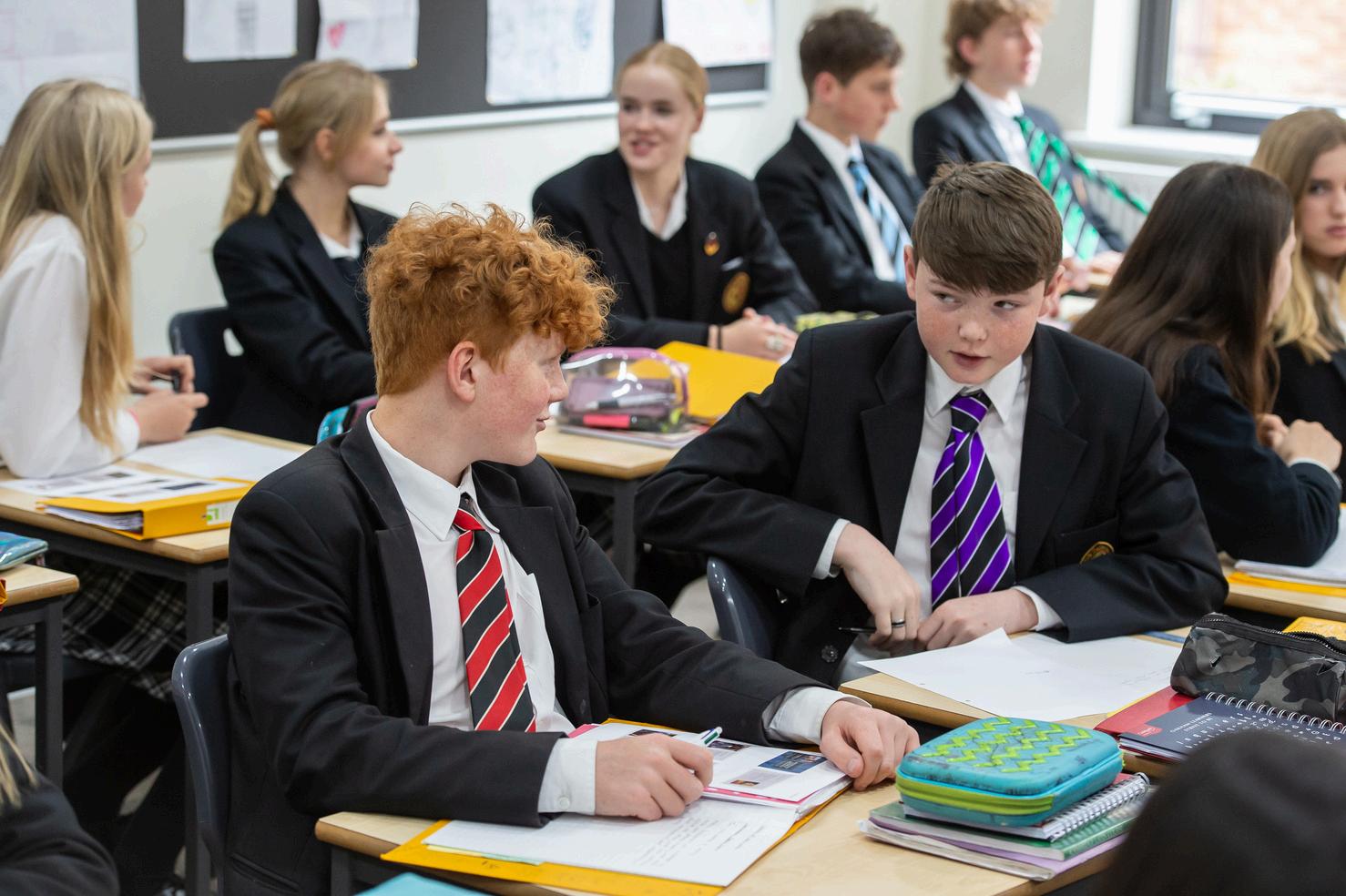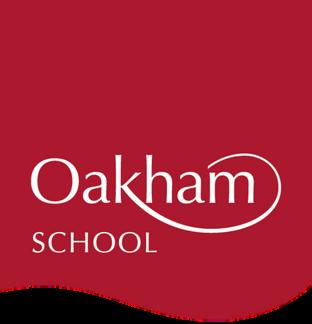
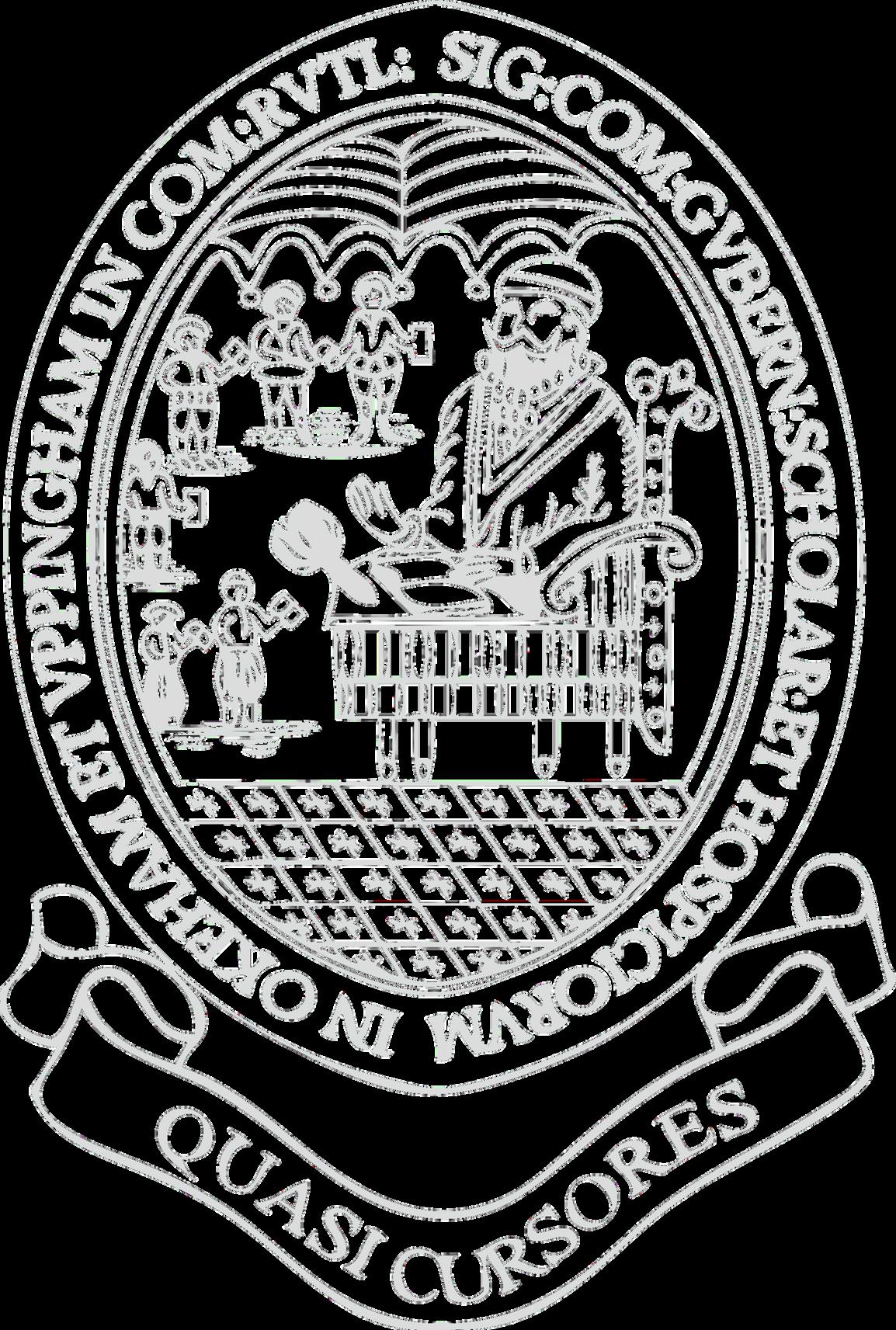



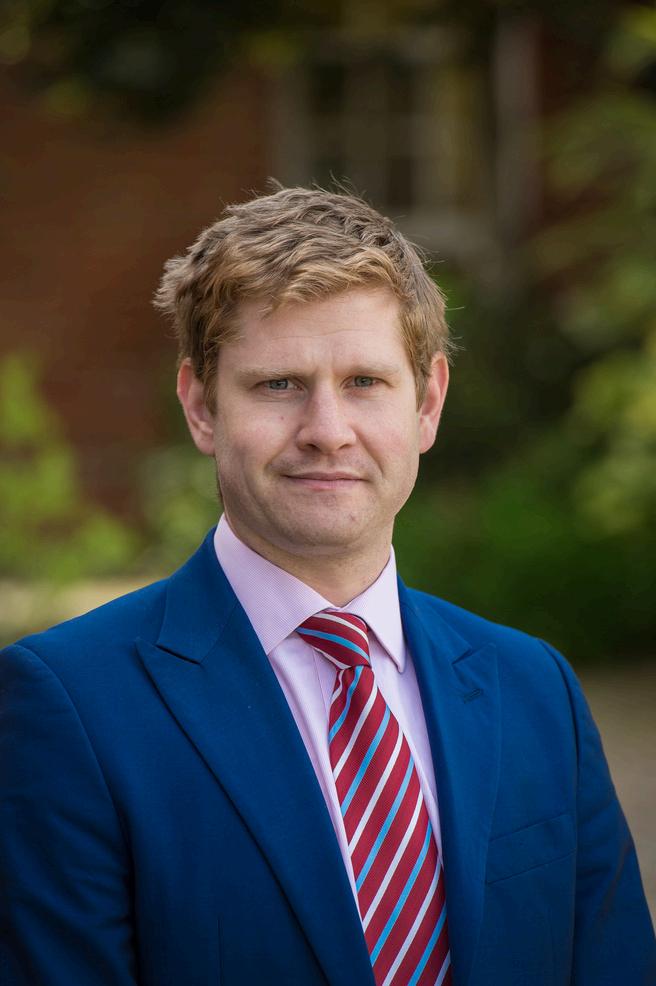
From January to April, Form 3 pupils begin the engaging process of choosing their GCSE subjects for the following September This forms an important part of their journey through Middle School and is one small part of Oakham’s Connected Curriculum, which blends academic challenge, co-curricular enrichment, and pastoral development.
Pupils typically study nine GCSEs, though it is possible to take between eight and eleven depending on each pupil’s academic and learning needs and their involvement in co-curricular activities such as sport, music, and drama. Tutors, HMs, and the Middle School team are available throughout this process to offer guidance and support.
As part of the Connected Curriculum, all pupils also take part in the Pastoral Curriculum, receiving one dedicated lesson each week These sessions complement the daily pastoral care pupils experience in their Houses and help to build self-awareness, resilience, and a sense of community in school and beyond.
At the heart of the Connected Curriculum is Oakham’s commitment to academic excellence Every pupil studies a broad and balanced range of academic subjects which develop intellectual curiosity, critical thinking, and independent learning
English Language
English Literature
Mathematics
Science (Biology, Chemistry and Physics)
At least one Humanity subject
A Modern Foreign Language (French, Spanish or German)
Pupils follow one of three Science pathways:
1 Combined science; All three sciences are studied and two GCSEs are awarded.
2.Separate Sciences: Each science studied as an individual GCSE and three GCSEs are awarded.
3.Flexible Combination: Any two Separate Sciences studied and two GCSEs are awarded
Additional Subjects (not examined):
Pastoral Learning Physical Education
This curriculum gives pupils a strong foundation in key disciplines while fostering confidence, creativity, and a lifelong love of learning
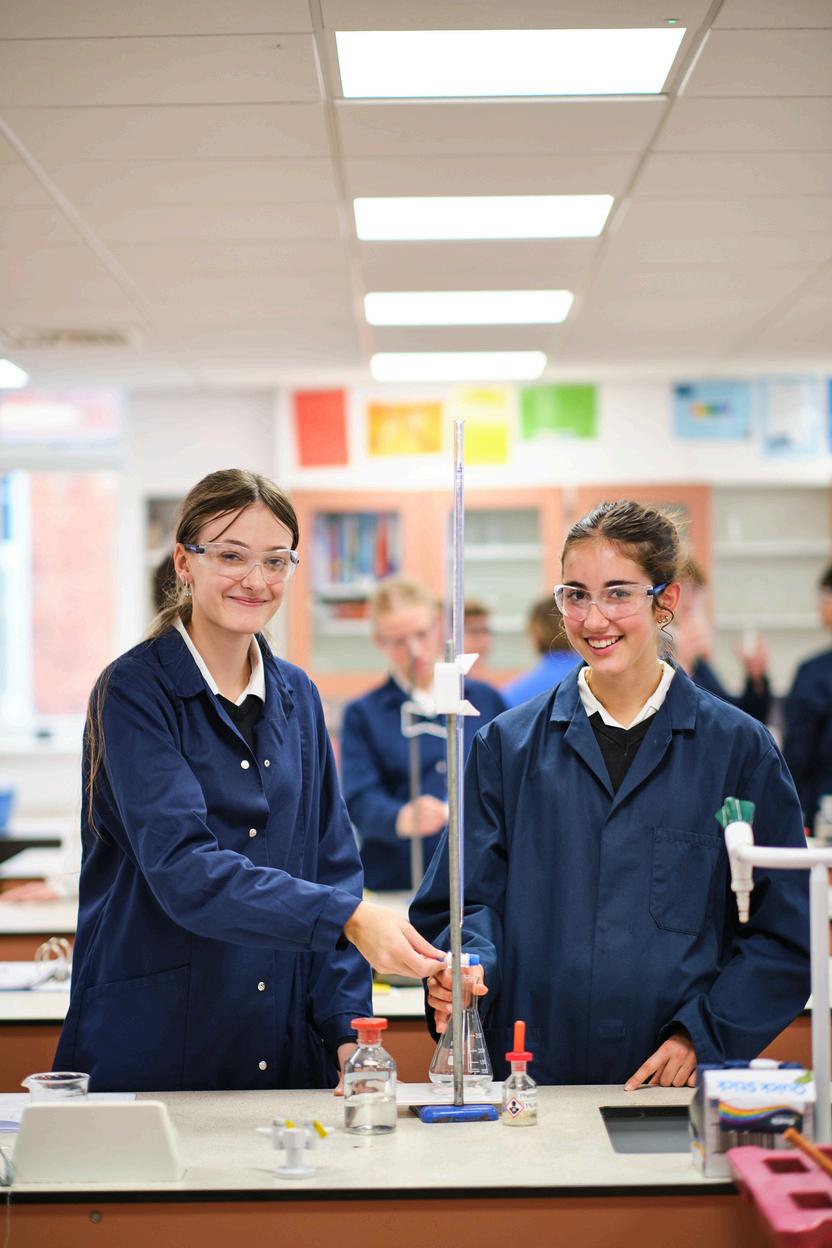
In addition to the core subjects, pupils have the opportunity to personalise their academic journey by selecting from a diverse range of option subjects These choices encourage deeper exploration, creativity, and personal expression within the Academic Curriculum
Option Subjects: Geography
History
Religion and Philosophy
Classical Civilisation
Classical Greek and Latin (“Gratin”)
Latin Citizenship Studies
Computer Science
Physical Education (GCSE)
Sports Science - Cambridge national Level 2
Art – Painting and Mixed Media
Art – Textiles
Art – 3D Design
Dance
Design and Technology
Drama
Music
These subjects help pupils to connect their academic learning to their interests and aspirations, while developing the analytical and creative skills valued in higher education and beyond
The Co-Curricular Curriculum is a definin feature of Oakham life. It provides pupils different opportunities to develop leaders teamwork, creativity, and perseverance through a wide range of activities that ext learning beyond the traditional classroom
Opportunities include:
Sport: Competitive and more recreati options across a variety of sports
Activities: A broad programme includ creative, technical, as well as the Serv based options below.
Service Options: Pupils, hav experienced 8 weeks of eac select one in the Summer Te continue through to Form 5: The Duke of Edinburgh’s Scheme
CCF (Combined Cadet F Voluntary Action
In addition, pupils participate in theatre, debating, external talks competitions, and both nationa trips. These experiences develo build confidence, and cultivate mutual interest in their friends a enquiry
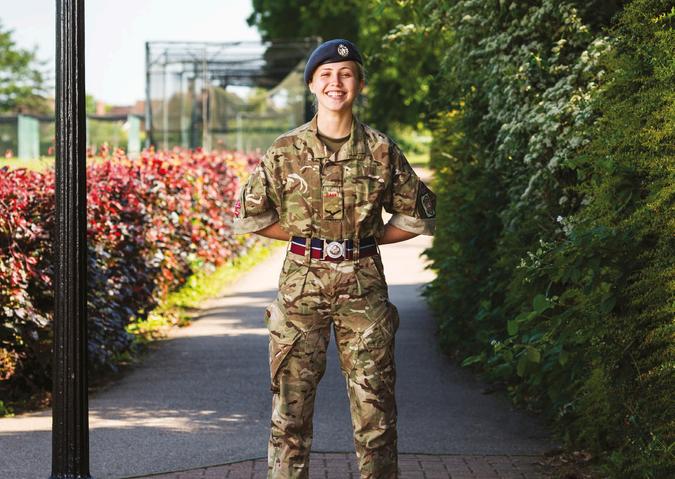
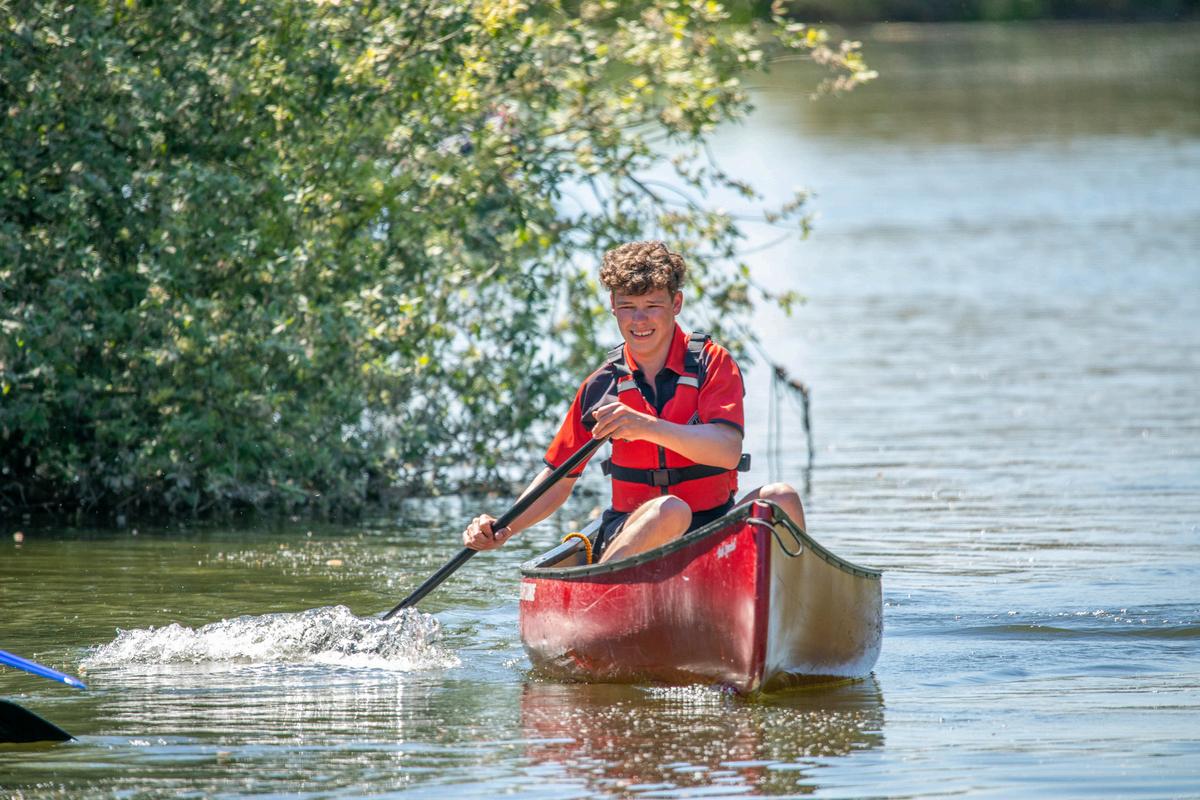
The Academic Curriculum at Oakham is designed to meet the needs of our pupils. Core subjects are taught in sets to ensure that teaching pace and challenge are appropriate for each pupil’s level
Each pupil uses a Personal Organiser to manage their timetable, set goals, and reflect on progress. Pupils work towards clearly defined academic targets, reviewed termly with their Tutors.
Supported study is available twice weekly for pupils who wish to reinforce their learning or seek additional guidance. For those studying nine or fewer GCSEs, structured study periods form part of the weekly timetable, helping pupils to develop independent learning skills and effective study habits
Progress Reports are issued each term, and parents can meet teachers during scheduled meetings or through their child’s Tutor to discuss attainment and effort.
Every pupil belongs to a House and is supported by a personal Tutor, who gets to know them well and helps guide all aspects of their development, their main focus is the academic, but tutors take into account their co-curricular, and personal development alongside those staff and HMs.
Tutors monitor progress, encourage balance in School life, and maintain close communication with parents They are the first point of contact for academic concerns, ensuring that every pupil feels known, supported, and cared for.

From Form 3 onwards, pupils are encouraged to consider their future pathways within the context of their Connected Curriculum journey Oakham’s Careers Department supports pupils in identifying their strengths, interests, and aspirations.
Each summer, Form 4 pupils complete the Morrisby Aptitude Test and Interest Questionnaire, followed by a personal interview with the Careers team in Form 5 Pupils receive a tailored report with guidance that informs subject choices and future study plans.
In Form 5, pupils begin building their CVs and exploring work experience opportunities, helping them make confident, informed decisions about life beyond Oakham.
Pupils choose one different subject from each of block A, B, C, D and E. Only one subject can be selected in a block.
Most pupils will take 9 GCSEs 10 GCSEs should be considered carefully with tutors 8 GCSEs can be taken after discussion with the Head of Middle School Leave one block empty if you wish to take 9 GCSEs
N B : If your subject choices don’t fit within the current grid, please let us know We’ll try our best to accommodate your preferences, but we can’t promise that changes will be possible
Where appropriate, and with the agreement of the Head of Middle School, some pupils may benefit from increasing or reducing their timetable to 10 or eight subjects
Pupils requiring Learning Support lessons may need to drop one subject to accommodate these –please discuss this with Dr Emma Stanley Isaac, Head of Learning Support esi@oakham.rutland.sch.uk 01572 758545.
It may be necessary for pupils requiring EAL lessons to reduce the number of subjects studied to accommodate these – please discuss this with Mrs Jan Irving, Head of EAL jmi@oakham.rutland.sch.uk 01572 758631. EAL pupils complete a language assessment in Form 3 to inform this decision.
2026 Dates Events
Mid January
Mid January
Early September
End of January
End of February
End of October/Early November
End of June
Early May
N B while we aim to offer as much choice of subjects as possible, we cannot guarantee to provide a subject if the number who choose it is very small. If pupils change their mind after options have been finalised, we will endeavour to accommodate their request, but it is likely that changes cannot be made
Form 3 student briefing and tutorial for Form 3 Booklets issued to students.
Briefing to Parents
Booklets published for parents in My School Portal
Parent-Teacher Meeting
Provisional choices made.
Discussions as appropriate Heads of Department and tutors check suitability of pupil choices
Pupil choices able to be viewed on My School Portal for parental corroboration
Deadline for return of confirmed final choices
People involved
Mr Favill (Head of Middle School) / Mr Aiken (Assistant Head of Middle School) / Pupils / Form 3 Tutors
Dr Dudin (Deputy Head Academic) / Mr Favill /Parents
Dr Dudin / Mr Favill
Teaching Staff / Pupils / Parents
Pupils / Tutors
Teachers / Pupils / Tutors
Mr Aiken / Mrs Asher-Roche (Director of Studies) /Mr Favill
Parents / Pupils / Mr Aiken / Mr Favill
In English lessons, we explore a diverse range of literary and non-fiction texts, nurturing a lifelong interest in literature, and providing pupils with opportunities to develop their own powerful writing, too Pupils will qualify for two distinct Edexcel IGCSEs: English Language and English Literature. Teachers will guide pupils through a broad scheme of work which will enable the pupils to engage individually with the subject, to extend the skills they have already developed in previous years, and to perform to the best of their abilities at IGCSE The course leads naturally towards study in the Upper School, be it as part of the International Baccalaureate Diploma or in English Literature A-level.
English Language is assessed via exams only, Paper 1 being 60% and Paper 2 40% of the qualification Paper 1 of English Language will involve responding to two passages (one prepared and one unseen) and producing a piece of transactional writing. Paper 2 of English Language will involve writing about a prepared extract/poem and producing a piece of creative writing. The Literature examination requires pupils to write about poetry (both prepared and unseen) and a novel For the English Literature coursework, pupils will write one essay on a play by Shakespeare and one essay on a modern drama text
The coursework and exam weightings are as follows:
ENGLISH LANGUAGE
Examinations: Paper 1: 60% – reading tasks (the passages are printed) and one transactional writing task Paper 2: 40% - written assessment of a prepared extract/poem and a creative writing task
ENGLISH LITERATURE
Examination Paper 1: 60% – unseen poetry, anthology poetry (texts provided in the exam), and modern prose (closed book).
Written coursework: 40% – modern drama and literary heritage text
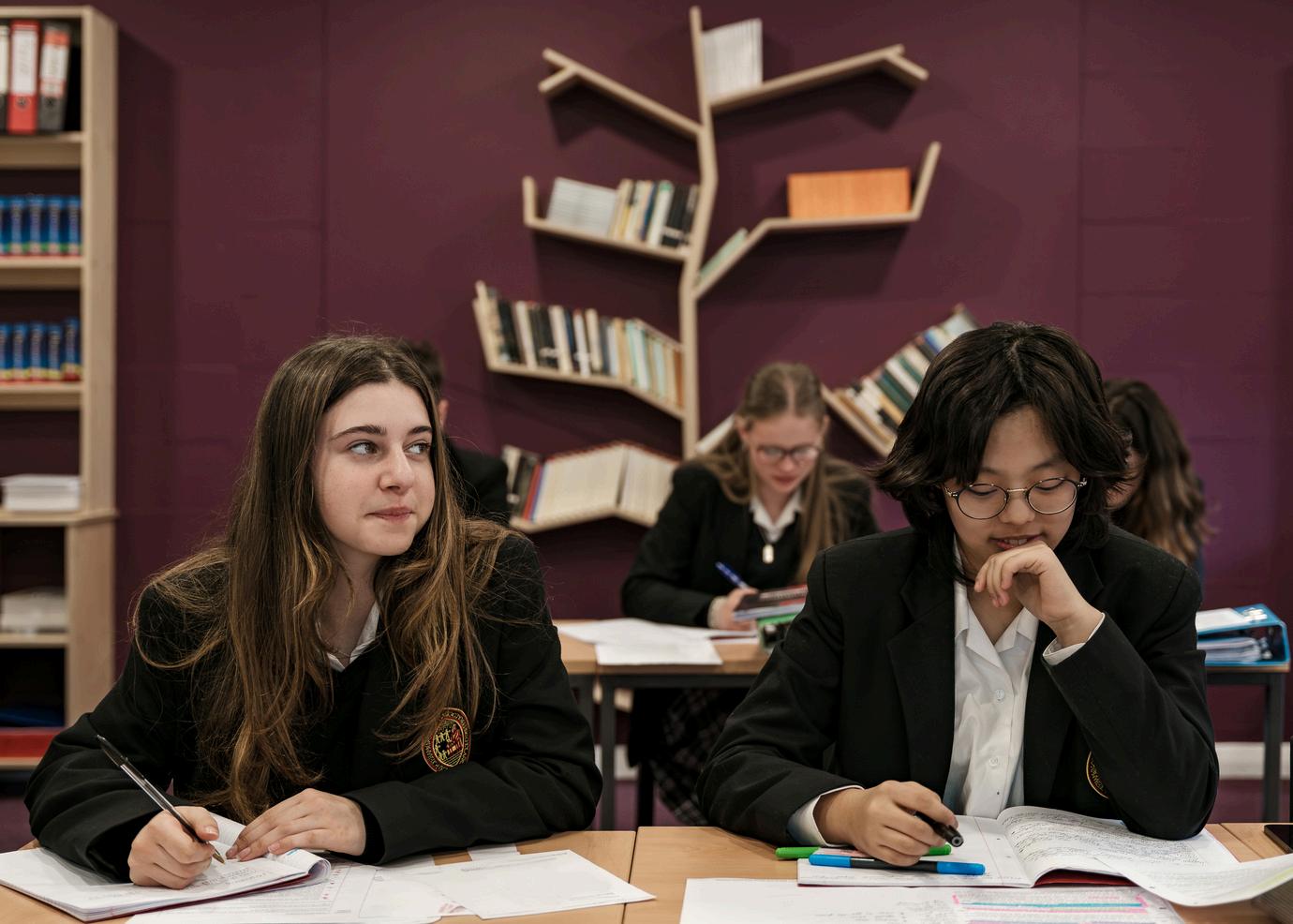
OPTION 1:
Pupils study Physics, Chemistry and Biology, leading to an AQA Double Award GCSE certificate (two GCSE grades are awarded), also known as Trilogy Science Candidates will sit two exam papers for each science subject, each lasting 1 hour 15 minutes There are two possible tiers of entry – Higher and Foundation These provide access to grades 9–4 and 5–1 respectively. Pupils have two lessons per week in each of Biology, Chemistry, and Physics.
GCSE Double Award Science is good preparation for pupils progressing to advanced science courses in the Upper School, whether that be A-level or the IB Diploma
OPTION 2:
For those who wish to extend and broaden their knowledge, pupils may choose to study Physics, Chemistry and Biology leading to the AQA Triple Award. Pupils choosing this option have a third lesson per week in each science, in order to complete the extra content. So, together with the core content of the Double Award pupils attain three separate GCSE grades in Biology, Chemistry and Physics Candidates will sit two exam papers for each science, each lasting 1 hour 45 minutes As with the Double Award, there are two possible tiers of entry for each individual science – Higher and Foundation. These provide access to grades 9–4 and 5–1 respectively.
GCSE Triple Award Science is the best preparation for those progressing to advanced science and/or technology courses in the Upper School, whether that be A-level or the IB Diploma
OPTION 3:
Pupils may choose any combination of at least two of the three sciences Pupils choosing this option have, three lessons per week in each of their two chosen sciences. So, together with the core content of the Double Award this leads to two separate GCSEs in their chosen two sciences But students should think carefully, a decision to drop a science at this stage may limit future career options Candidates will sit two exam papers for each science, each lasting 1 hour 45 minutes There are two possible tiers of entry for each individual science – Higher and Foundation These provide access to grades 9–4 and 5–1 respectively
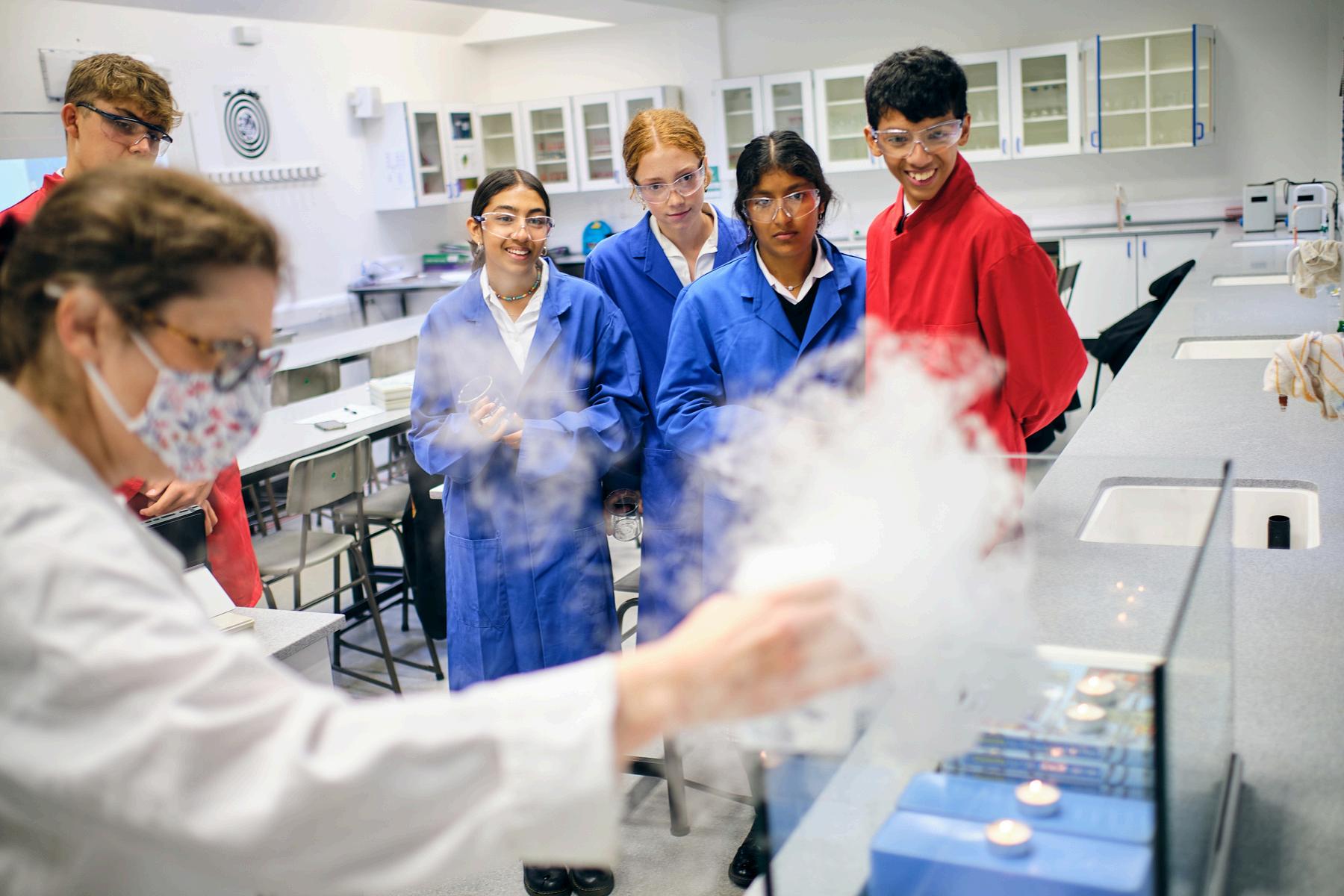
All pupils study the Edexcel IGCSE Mathematics Specification A (4MA1) course, and the expectation is that most pupils will sit the Higher Level papers at the end of Form 5.
Each set progresses through the core examination material at the pace which best suits its learning approach and retention of prior knowledge. Enrichment through discovery, puzzles and openended tasks is valued alongside accurate and fluent core mathematical skills. The core IGCSE syllabus prepares pupils for their mathematical study beyond Form 5 The highest sets will also have the opportunity to encounter more varied and advanced concepts beyond this core syllabus, and also to encounter mathematical writing. For the most able students, there is the opportunity to sit further examinations where we offer the AQA Level 2 Certificate in Further Mathematics which extends into some Upper School material and we also offer chances to sit the Edexcel Level 2 and Level 3 Algebra awards which extends the specific knowledge tied in with Form 5 algebra content.
A significant number of the highest sets may be entered for the individual UKMT Intermediate Maths Challenge in the Spring Term, with the opportunity to progress to the invitational follow-on rounds.
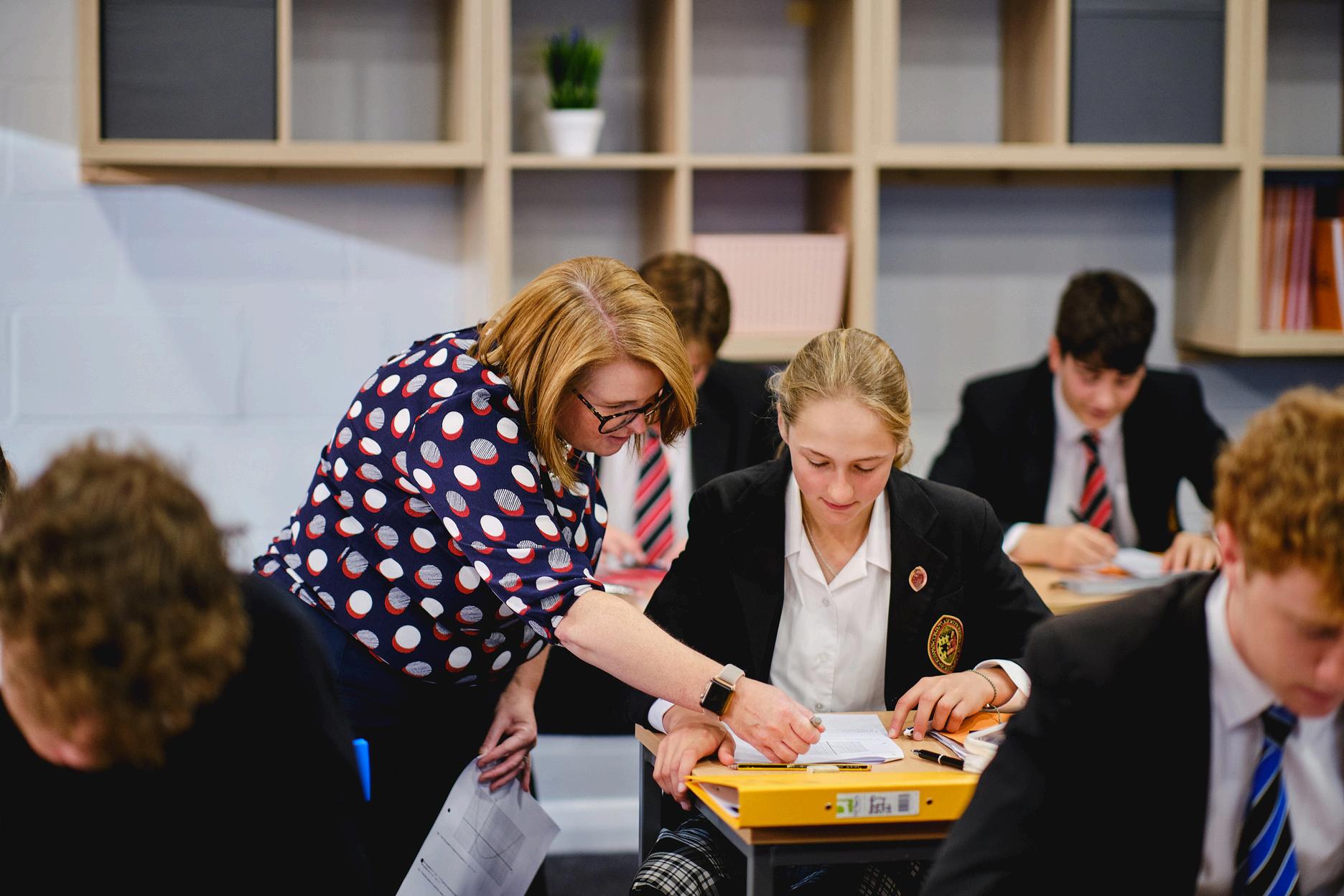
Choosing French for GCSE is your chance to learn a skill that will stay with you for life The new Edexcel course (first exams in 2026) is exciting, practical and designed to help you communicate with confidence You’ll explore themes that matter to young people today, such as My Personal World, Lifestyle and Well-being, My Neighbourhood, Media and Technology, Studying and the Future, and Travel and Tourism.
The course is tested in four parts - reading, writing, listening and speaking - and each counts for 25% of your final grade. The speaking exam happens in March of Form 5 and lasts about 10 minutes, including a read-aloud, roleplay and photo description. Listening (1 hour) lets you hear every question three times, answers are in English and includes a short dictation Reading (1 hour) are answers are in English and it includes a translation from French into English Writing (1 hour 20 minutes) gives you two short writing tasks to complete, plus a short translation from English into French.
To build your speaking confidence, you’ll get a weekly 25-minute session in pairs with a native French language assistant By the end, you’ll be able to chat in the past, present and future tenses!
There’s also lots of enrichment - celebrating Frenchspeaking cultures, exploring history and traditions, and even a 90-minute immersive French restaurant experience before the speaking exams.
Learning French isn’t just fun - it gives you a global skill, boosts your memory and problem-solving, and opens doors to travel, study and careers across the world.

Why choose Spanish GCSE at Oakham?
Spanish isn’t just a subject – it’s your passport to the world! With over 480 million native speakers, Spanish is the second most spoken language on the planet. Studying Spanish at GCSE opens doors to exciting travel, global careers, and amazing cultural experiences
At Oakham, we follow the Pearson Edexcel course, you’ll explore real-world topics that matter to you – from identity and hobbies to social issues, travel, the environment, and the world of work. You’ll develop your listening, speaking, reading, and writing skills while learning to communicate confidently in one of the most important global languages
Highlights of the course include:
Talking about your life, future plans, and dream jobs
Learning how to travel with ease in Spanish-speaking countries
Exploring film, music, and culture across Spain and Latin America
Building skills that make you stand out to colleges, universities, and employers
Exploring Spanish food through breakfasts and cultural events which are celebrated in the department
Studying Spanish is more than learning a language – it’s gaining a superpower. Whether you want to study abroad, boost your career prospects, or simply connect with millions more people around the world, Spanish GCSE is one of the best choices you can make
Be curious. Be ambitious. Be global. Choose Spanish.
Studying German opens up exciting opportunities for your future Germany is one of the UK’s most important trading partners and a leading force in business, politics, and science Employers in engineering, technology, medicine, finance, and law actively seek people with language skills, and German is one of the most valuable. Being able to communicate in German gives you a competitive edge, whether you want to work in the UK or abroad
The Edexcel GCSE German course has been designed to be both accessible and inclusive, so that all learners are able to reach their potential Assessments use clear, straightforward language and familiar contexts, with scaffolding built in to help you show your ability. Tasks reflect real-life situations and give plenty of opportunities to succeed, whatever your learning style Support is also available for students with additional needs, making the course open and achievable for everyone.
You’ll develop your ability to speak, listen, read, and write in German while exploring themes such as identity, culture, education, work, and global issues.
Choosing German means gaining a qualification that is practical and highly valued by employers and universities

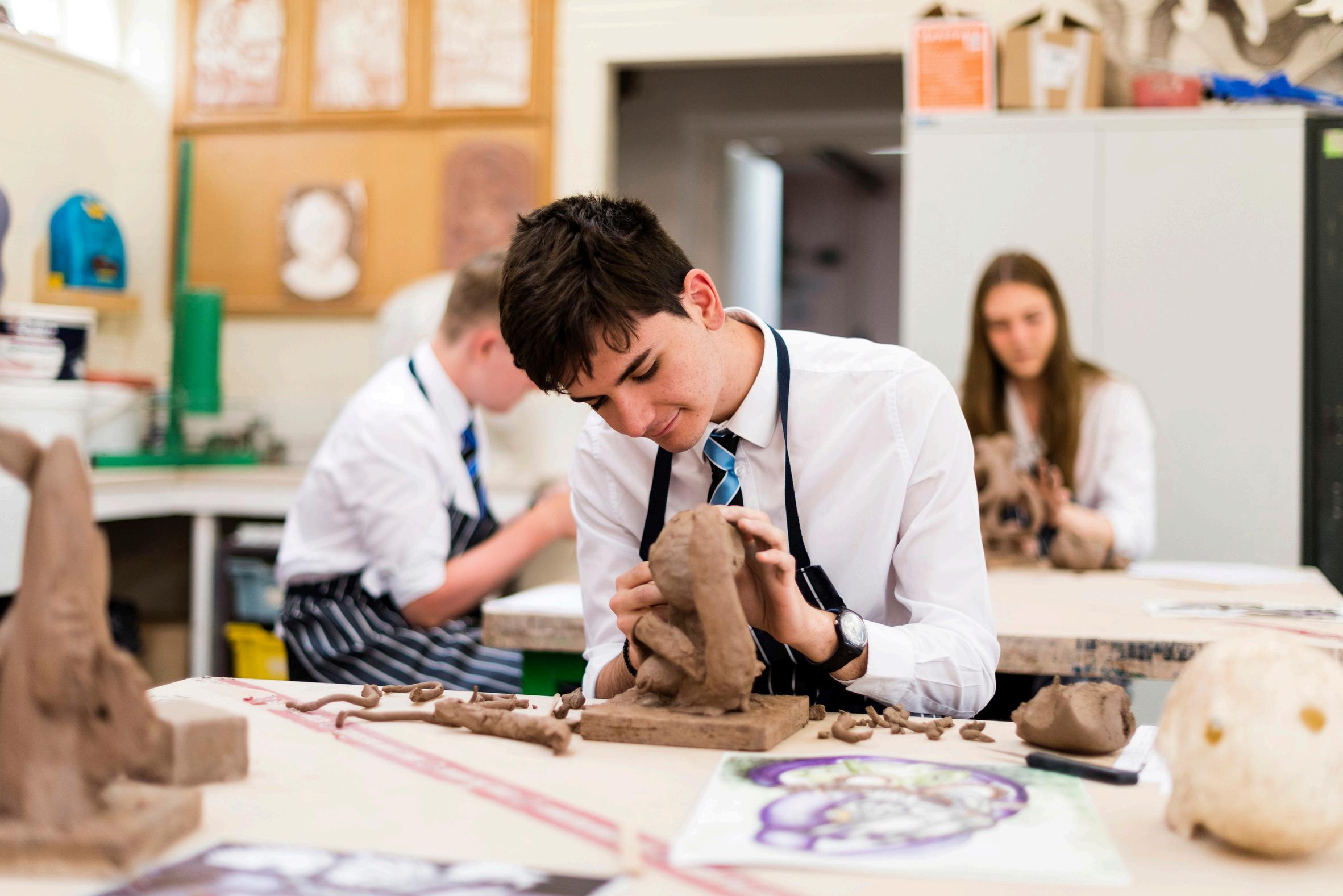
Pupils work on two components: the Personal Portfolio (60%) and the Externally Set Assignment (40%). The focus is on the Personal Project until January in Form 5 and this involves using sketchbooks to research; through drawing, by taking photographs, through annotation and experimentation with a range of media The pupils are encouraged to be playful with their ideas and the course encourages self-expression and the development of personal responses. Pupils will learn a range of new practical skills, as well as how to analyse the work of others.
For the Externally Set Assignment, pupils begin this project in Form 5 Pupils develop work in response to a starting point offered by the exam board for around 12 weeks before a timed examination session of 10 hours to bring the project to an exciting conclusion.
There are museum visits to the Pitts Rivers Museum and Ashmolean Museum in Form 4
Pupils opt for one of the following areas of specialisation:
This involves drawing, painting, digital photography and mixed media, as well as collage work and print making A wide variety of styles from the figurative tradition to abstract painting are explored
This is a creative course in the expressive use of constructed textiles, batik, embroidery (hand and machine), creative garment construction, dyeing, painting, silk painting, fabric appliqué and felting
This course explores architectural design, interior design, environmental/landscape design and sculpture and pupils will study how form and space interact in the man-made environment Three-dimensional model making will allow pupils to explore the properties of materials and how this determines the formal qualities of the objects and spaces around us
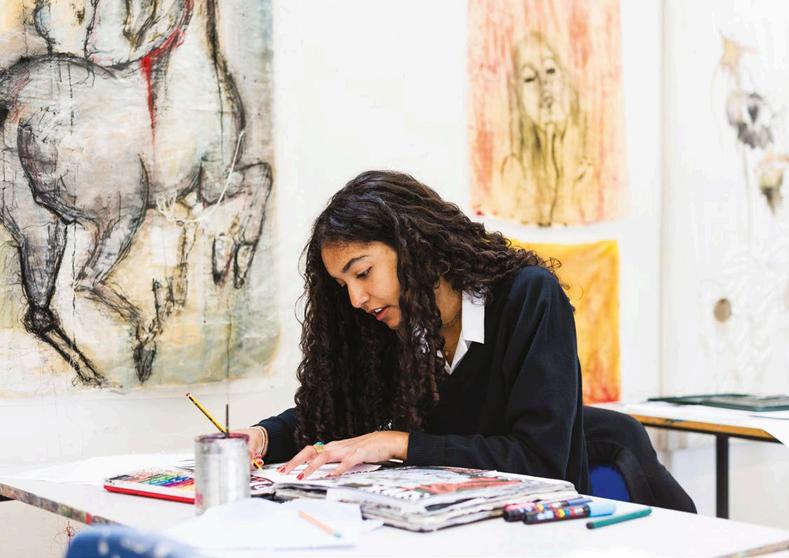
How citizens can try to make a difference to the society they live in. This GCSE course is an excellent introduction to current affairs, the UK legal system and UK Government institutions with a local, national and global perspective
Citizenship Studies is a useful precursor to the study of Economics, Business and Politics at A-level or in the IB Diploma. Pupils should be willing to discuss and debate issues in which there is no ‘right’ answer, but evidence can be presented for both sides before making a personal judgement. The written style required is exactly the same as in other humanities subjects
The content revolves around three central themes:
Our Rights, Responsibilities and the Law
Origins and need for human rights, including conflicts (e.g. right to privacy vs. safety).
Exploration of the UK legal system (civil and criminal)
How UK law is administered and enforced
Roles of civilians in the legal process (e.g. magistrates, special constables)
Citizenship in action
Focus on political systems, especially China and Switzerland.
Examination of UK representative democracy: national, local, and regional governance, elections, and decision-making
Strengths and weaknesses of UK political decisionmaking.
Influence of pressure groups, media, taxation, and government spending on public services like education, health, and welfare.
Our society and our links with the wider world
The UK’s international role: UN, Commonwealth, NATO, EU, trade, and global crises
Effectiveness of UK interventions abroad
Exploration of identity and diversity in the UK’s multicultural society
Importance of tolerance, diversity, and community cohesion
This is all supported by an active citizenship campaign worth 15% of the overall GCSE mark.
Completed in teams (4–6 pupils) in Year 10 summer term.
Projects connect with external organisations and involve teamwork, planning, research, and public speaking
Example campaigns: setting up a lending library, providing playground equipment for disabled children, supporting refugees, or promoting inclusion in sports
Assessed individually as part of Paper 2.
There are three exam papers:
Paper 1 (25% of the final mark) is multiple choice
Paper 2 (50% of the final mark) Questions on this paper have stimulus material to interpret, analyse and evaluate The questions range from factual recall to building extended answers with a balanced line of argument and a conclusion. This paper includes specific questions on their citizenship action
Paper 3 (25% of the final mark) Stimulus material with a focus on extended writing.
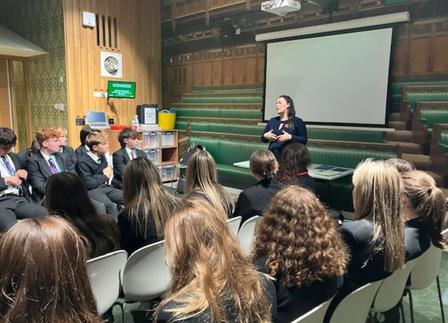
In Classical Civilisation we study the ancient history, the myths, the culture and literature of ancient Rome and Greece There is no Latin or Greek language involved
The course takes in a wide variety of material. We look at the way the ancient Greeks and Romans lived, fought, loved and died. We read extracts from authors such as Homer and Virgil about the destruction of Troy, the judgement of Paris, the duel between Achilles and Hector, and other great myths We study the way the Romans and Greeks fought battles and won wars, often against overwhelming odds, as well as ordinary life
In Form 4 pupils study modules called 'War and Warfare', and in Form 5 'Women in the Ancient World'.
In this component, pupils study some of the greatest battles of the ancient world (such as Thermopylae, Actium) and how the Athenian, Spartan and Roman armys were recruited, trained and fought We study written descriptions, artistic depictions, and archaeological remains.
This component is assessed through one written exam lasting 1 hour 30 mins, worth 50% Question types include short-answers calling for a word, name or fact,; responses to an extract of text, diagram, picture of a statue and so on; short 15-mark essays often comparing (for example) two battles and discussing which was strategically better fought
The assessment consists of two exams, each equally weighted at 50%. There is no coursework.
In this component, worth 50% and assessed by a separate exam to War and Warfare, we study the lives of ordinary and extraordinary women Some of these come from the world of myth (including Helen, who is key to the Trojan War, and Medea, a witch and murderer), as well as history (such as Cleopatra) As in the previous component we study art, textual sources, and other types of evidence to learn about these key figures
We visit the British Museum and examine up close some of the material we study in the course.
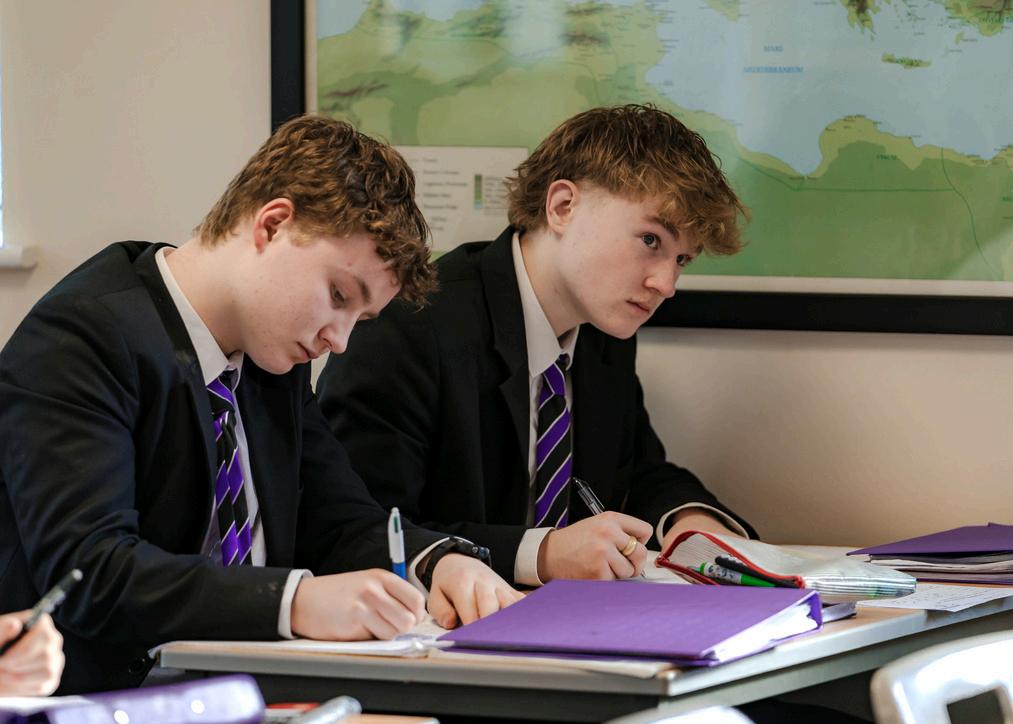
Our GCSE in Computer Science is engaging and practical, encouraging creativity and problem solving. It encourages pupils to develop their understanding and application of the core concepts in Computer Science Pupils also analyse problems in computational terms and devise creative solutions by designing, writing, testing and evaluating programs. The breakdown of assessment is as follows:
Computer systems (Written 50%) Introduces pupils to th unit (CPU), computer memo representation, wired and w network topologies, system software It also looks at ethi environmental concerns ass Computer Science.
Computational thinking, alg programming (Written exam Pupils apply knowledge and gained in component 1. The understanding in computat algorithms, programming te robust programs, computat translators Pupils are given undertake programming tas of study which allows them to design, write, test, and re high-level programming lan
Is this course for me? Typica in their study of Computer S possess a strong mathemati y
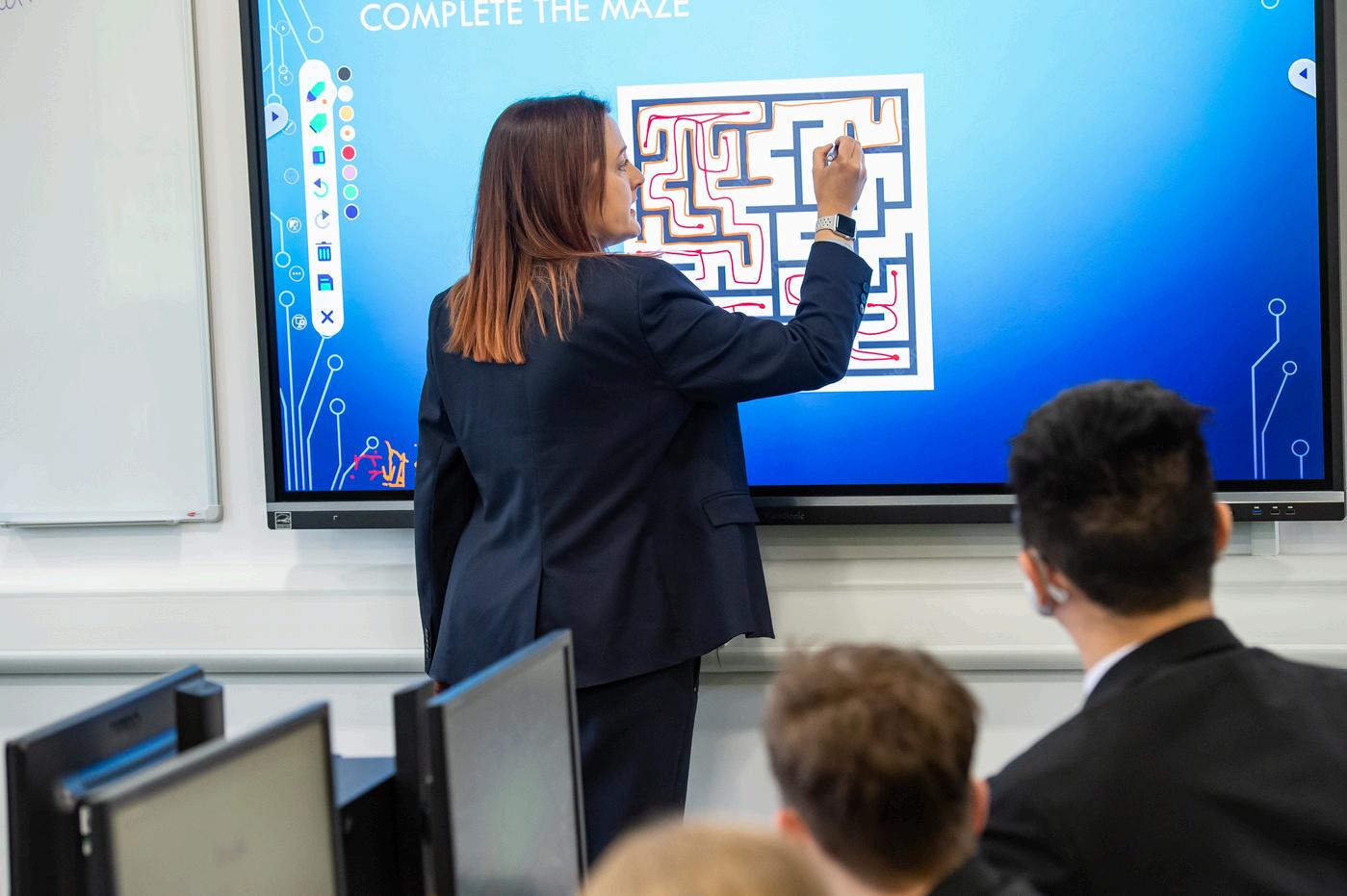
GCSE Dance is a two-year course. Dance training is not essential but an interest in dance and a willingness to learn to move in different ways Performance is required in some components but with teacher support and input In other sections there is an opportunity to choreograph and get another student to perform your work if you feel that performing yourself is not your forte. GCSE dance consists of two components. The first is a performance and choreography section and the second component is dance appreciation.
Solo performance: Students must learn how to perform as a solo dancer for approximately one minute You will learn four set routines to perform as a solo. After you have learned all four, together we will choose the two phrases which showcase your skills and feel the best for you when performing.
Duet/trio performance: Each student must perform for a minimum of three minutes in a dance The duet/trio dance may be choreographed by a teacher, dancer or by collaboration between teacher and dancers. The duet/trio performance must have a clearly identified choreographic intent, which relates to mood, meaning, idea, theme and/or style fusion You will incorporate actions, dynamics and spatial elements from the solo performance (the two set phrases) and these will be developed in this duet/trio to generate dance content
Dancers will learn how to respond creatively to an externally set stimulus, to choreograph their own dance The dance created must be either:
A solo dance of a minimum of two minutes and a maximum of two and a half minutes or
A group dance of a minimum of three minutes and a maximum of three and a half minutes for two to five dancers
The student is not required to perform in their choreographed dance but may do so if they wish
The subject content details the knowledge, understanding and skills that students are expected to learn during study. This is set out in three core areas of dance: performance, choreography, and appreciation Through written communication and use of appropriate terminology, students must be able to critically analyse, interpret and evaluate their own work in performance and choreography and demonstrate their knowledge and understanding of professional practice in the six-set works in the GCSE Dance Anthology The consists of six short professional works, each between 12- and 30minutes duration
Non-exam assessment (NEA) 60% Written Exam 40%
Join us for free dance lessons every Wednesday evening, with chances to perform in showcases during the year.
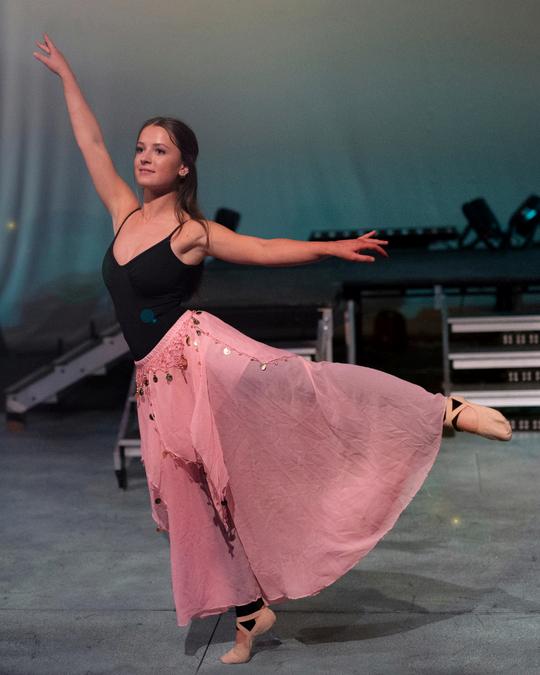
The GCSE Design and Technology course places an emphasis on understanding and applying an iterative design process to solve real and relevant problems Pupils use creativity and imagination to design and make prototypes that consider their own and others’ needs, wants and values. The course prepares pupils to participate confidently and successfully in an increasingly technological world, as well as to consider wider influences on design, including historical, social, cultural, environmental, and economic factors
This course gives pupils opportunities to explore their own design interests and will provide a substantial foundation to A-level or IBDP Design and Technology. Pupils who wish to pursue a career in Engineering, Industrial Design, Product Design or Architecture can apply for an Arkwright Scholarship on successful completion of the course Pupils will learn how to communicate and present ideas using a wide range of techniques, to include sketching, rendering, formal drawings and CAD. Pupils will also have the opportunity to develop practical and ICT skills using a wide range of materials, processes and applications before starting the NEA project.
Educational visits include a trip to the Morgan Motor Factory
The core technical principles include: new and emerging technologies; energy storage and generation; modern and smart materials; systems approach to designing; mechanical devices; materials and their working properties (to include papers, boards, textiles, composites, polymers, timber and metal)
Section A – Core technical principles (20 marks): a mixture of multiple choice and short answer questions assessing a breadth of technical knowledge and understanding
Section B – Specialist technical principles (30 marks): pupils can either choose to focus technical principles on Polymers/Textiles Several short answer questions (2–5 marks) and one extended response to assess a more indepth knowledge of technical principles.
Section C – Designing and making principles (50 marks): a mixture of short answer and extended response questions, including a 12-mark design question.
Coursework is a single, controlled design-and-make activity selected from a choice of set tasks, consisting of the development of a made outcome and a concise design folder which includes ICT, to design and make a solution using a range of appropriate materials. Previous projects include: iPod docking stations, lamps, radios, alarm systems, disability aids, storage systems, products for developing countries and electronic games. Textile outcomes could include bags, sportswear and fashion garments, storage, soft furnishings, and toys
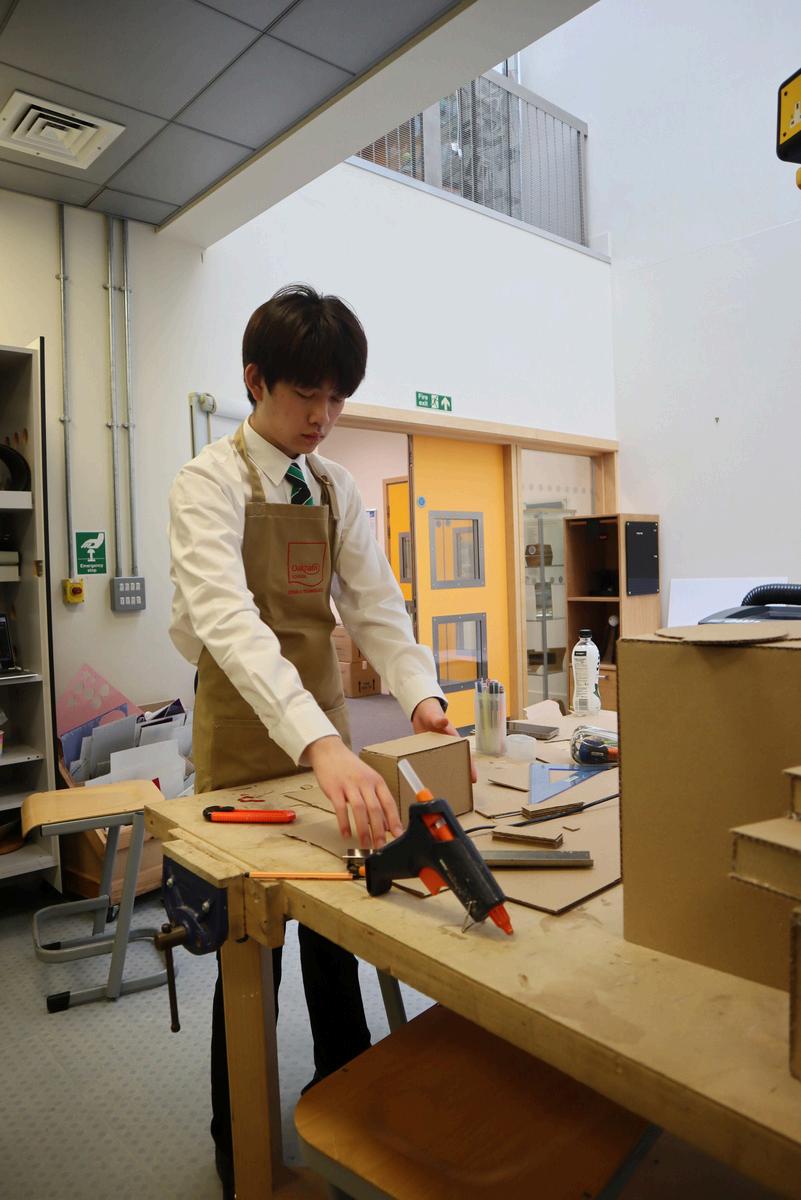

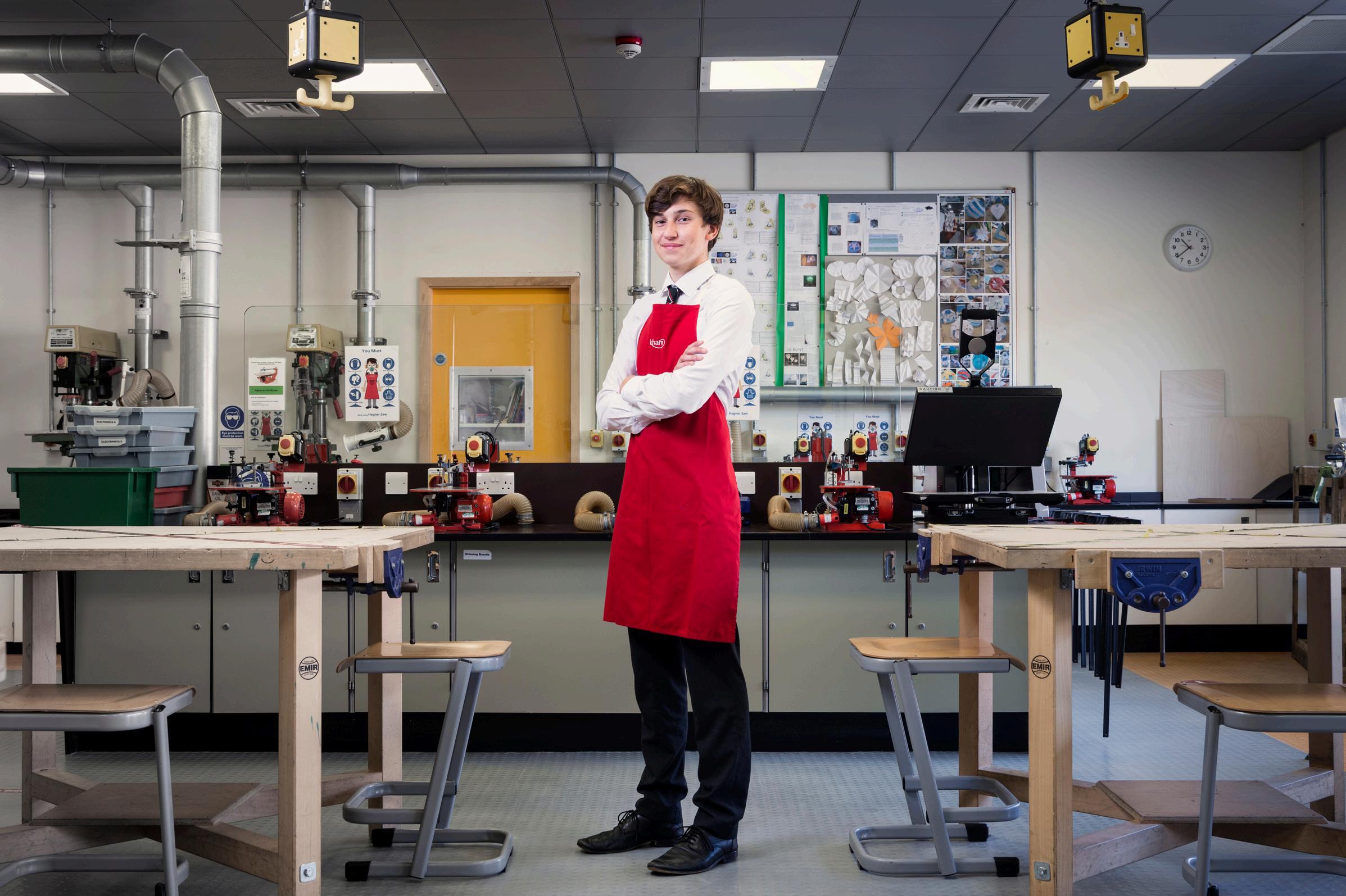
The Drama GCSE course is a two-year study of live performance and the processes of creating theatre. It is practical in its approach and pupils are expected to work physically and in workshop conditions for many of their lessons Pupils are expected to have a lively interest in and commitment to theatre We visit professional productions at least once a term and pupils should attend all productions and examination work in the QET.
The breakdown of the modules is as follows:
Unit 1: Devised Performance and accompanying written report (40% Internally Assessed / Externally Moderated) Candidates will be given a stimulus and a genre and must create their own practical performance and can be assessed as either an actor or designer Alongside this, candidates will write a portfolio documenting their devising process and evaluating the final performance
Unit 2: Performance from a Text (20% Externally Assessed) Candidates will perform two sections from a published play and be assessed as either an actor or designer The design choices on offer are lighting, sound, costume and set design
Unit 3: Written Examination (40% Externally Assessed)
Candidates will sit a 90-minute written exam at the end of the course The majority of the paper will be based on their ability to analyse one set text as an actor, designer and director. One question will ask candidates to evaluate a live theatre performance
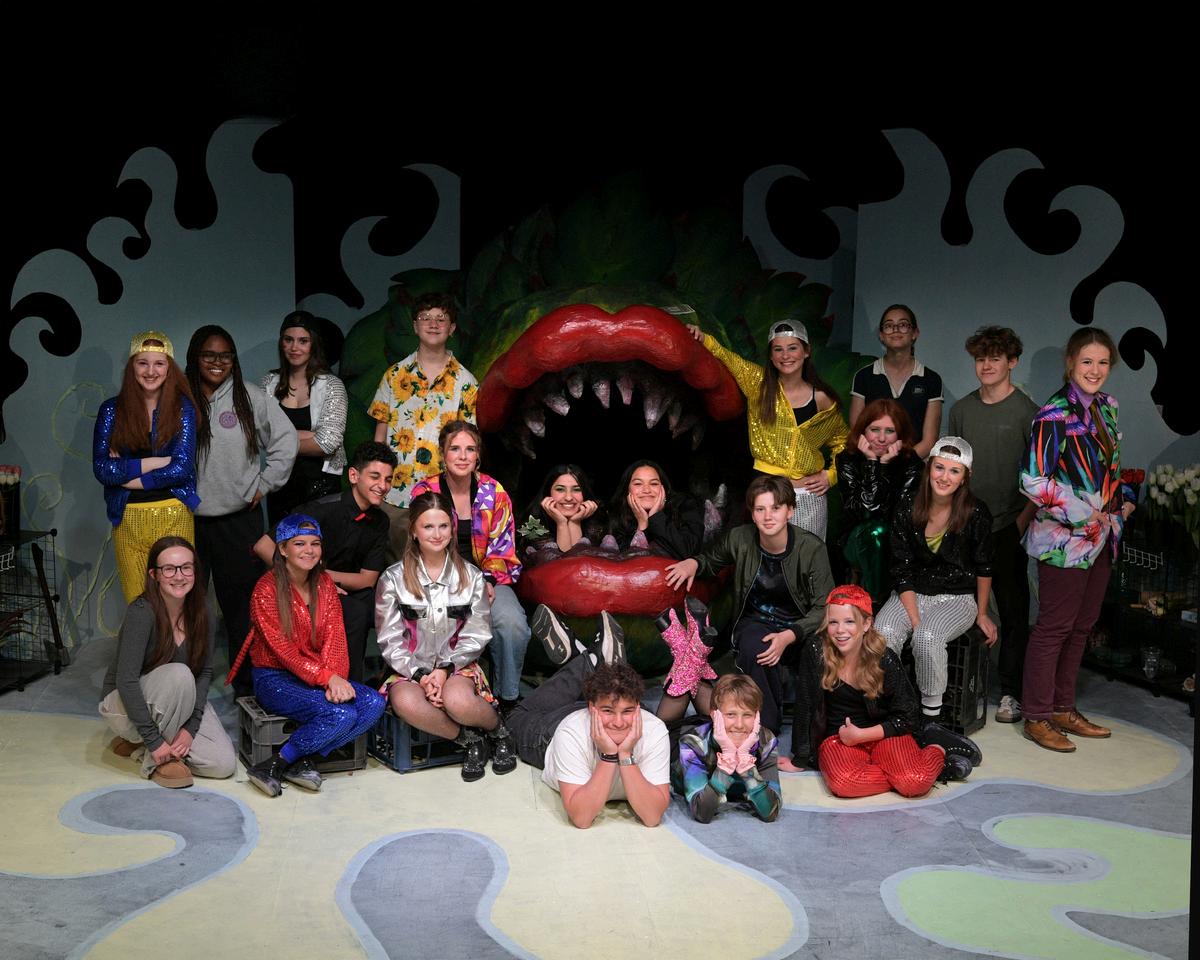
We offer enrichment in Actor Training and Musical Theatre, with opportunities to take part in shows throughout the year These performances give keen actors the chance to gain experience and develop their skills The Director of Drama also personally mentors pupils who are interested in pursuing a career in the profession In addition, LAMDA lessons are available as specialised acting training.
The Geography course encourages pupils to develop lifelong geographical skills These include: understanding both physical and human processes; location on a local, regional and global scale; and how communities around the world are affected and constrained by different environments Pupils will also develop the ability to use and interpret geographical data and information
There are two papers. Paper 1: Physical Geography (Coasts and Hazardous environments) Paper 2: Human Geography and Global Issues (Economic activity and energy, Urban environments and Fragile environments and climate change).
There is no coursework, but pupils will spend time on a variety of geographical skills, using resources that include photographs, maps, diagrams, graphs and GIS
Pupils will develop a variety of fieldwork skills, based on their field trips to Hunstanton in Form 4 and either Cambridge or Lincoln in Form 5 Pupils also have the opportunity to attend a Middle School Geography international field trip Past trips have included Sicily, the Azores, Naples and the USA. The next trip will be to Iceland in April 2027
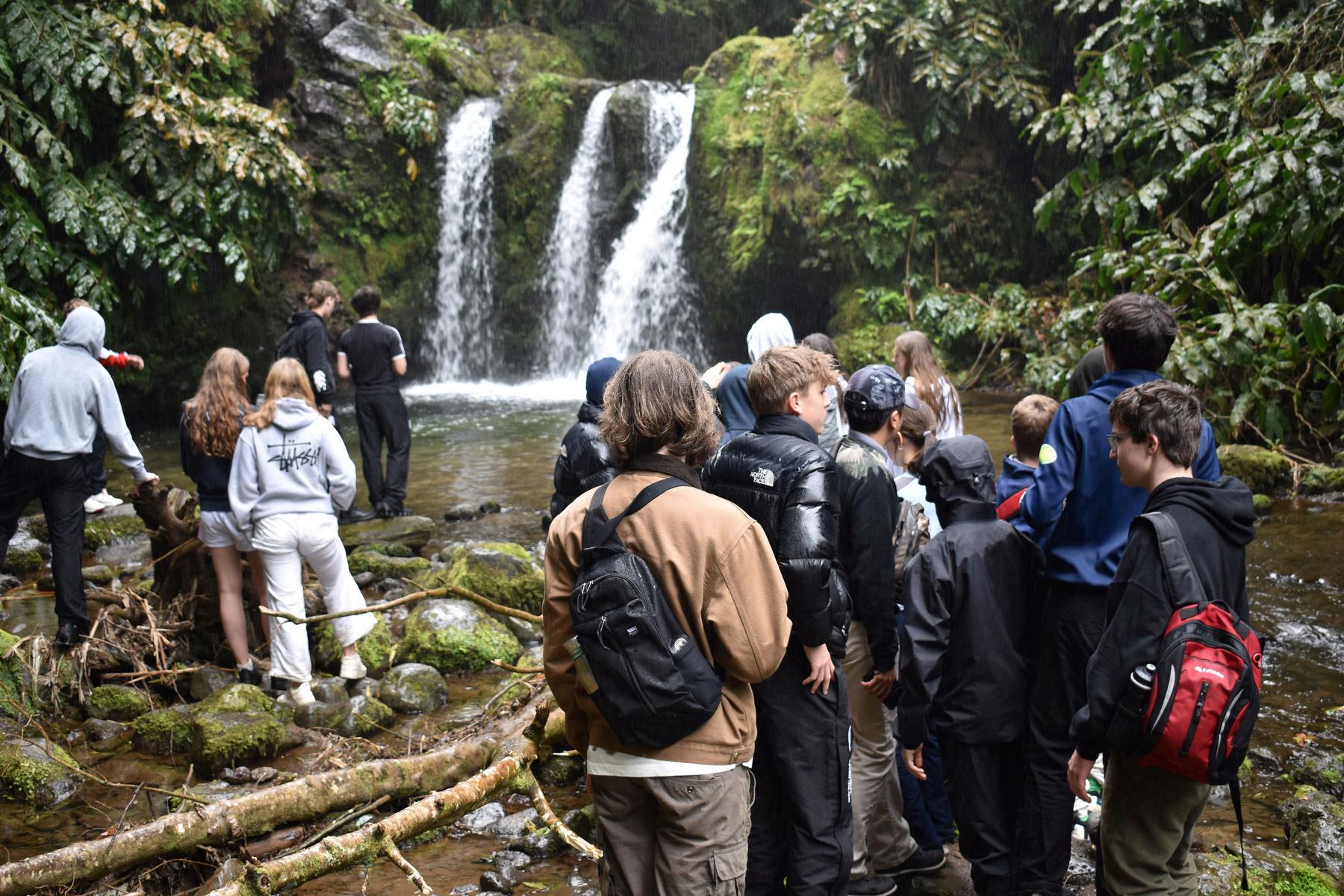
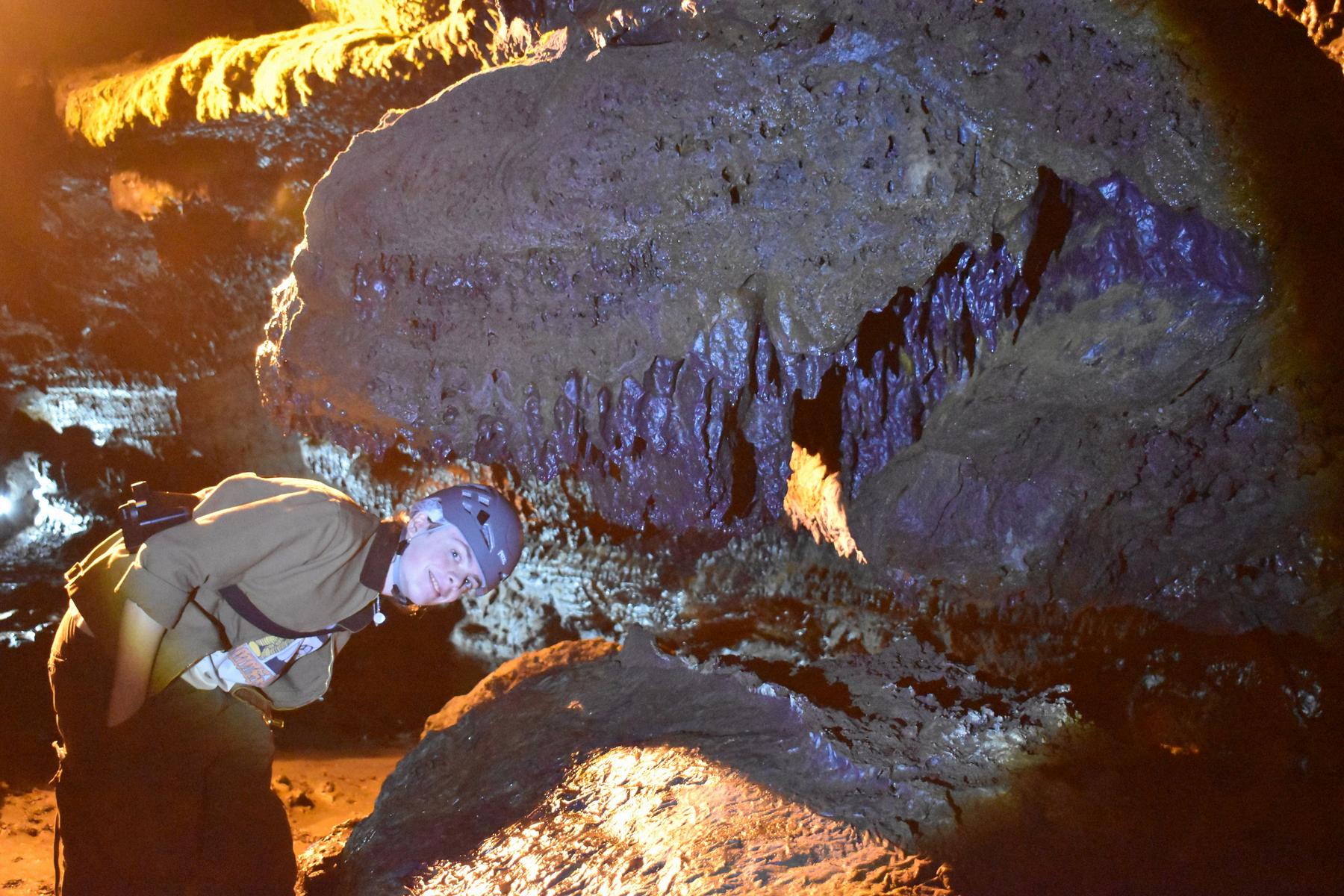
From the start of Form 4, Classical Greek may be studied alongside Latin as part of the Greek-and-Latin or “Gratin” course This course enables hard-working and able pupils to achieve two full GCSEs in both Latin and Greek; the Greek is taught from scratch This combined course is taught in a single subject timetable slot, known as Gratin
We follow the OCR courses; for details of the Latin, please see below.
The Greek exam is comprised of three written papers There is no coursework
The aim of the course is to enable pupils to translate unseen passages and to acquaint them with the work of Greek prose and verse authors, thereby opening up to them the ancient world generally, its history and culture In Form 4 they will complete almost all the GCSE language requirements and start their prose literature This is often entertaining passages, for example from the Greek historian Herodotus (called both the ‘Father of History’ and the ‘Father of Lies’).
In Form 5 pupils will complete the prose literature and read some Homer (Iliad or Odyssey) These verse texts are absolutely foundational to our society, and comprise the high-point of literature, with which pupils will be able to engage in the original language
Gratin is both a challenge and immensely rewarding as they get to grips with real Greek authors It is hard work but stretches the brains of the pupils admirably. Almost all Gratinists report a high level of personal satisfaction once they have managed to master the course ’ s requirements
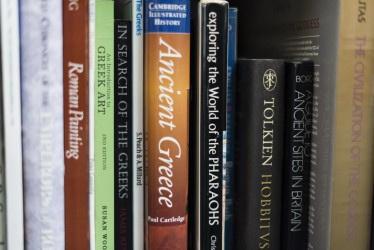
The History specification focuses on Modern World History and features a selection of fascinating topics for study:
Paper 1 (50%) Pupils will undertake two ‘depth studies’. The first will be on Nazi Germany: how Hitler rose to prominence and then took power in 1933; how the Nazis consolidated their grip on power, establishing a police state, and how Hitler then led the German people into war and genocide The second ‘depth study’ will be on a topic which has caught the imagination of Oakhamians over the last four years (as part of the old GCSE course): Civil Rights in the USA, 1945–1974. This involves the extraordinary struggle undertaken by African-American campaigners to achieve full civil rights after the Second World War in the face of violent racism, and led, most notably, by Martin Luther King The topic is brought to life in the most extraordinary fashion by extensive documentary news footage and also through some powerful movie portrayals – the most famous and recent example being Selma, which we scrutinise and evaluate in class.
Paper 2 (50%) consists of two examined ‘outline’ topics, where pupils are required to study the key theme of change and progress in a political and social context In a new departure, we have decided to study the ‘Changes in Medicine’ option, believing that this will build upon some of the foundation research work completed as part of the First World War project, and provide interesting context and understanding for our scientists and aspirant medics The course covers the development of modern medicine from 1848 to 1948, with particular focus on the turning points that provided the key agencies of change Therefore, as well as studying the development of scientific and medical research, and the role of government in promoting improved public health through law and policy-making, pupils will also see how two world wars acted as a catalyst for extraordinary scientific advances Our second topic for study for Paper 2 provides a sharp contrast as we study the Russian Revolution: how this vast nation underwent the most remarkable trauma and upheaval in making the transition from the three-hundredyear-old, imperial, Romanov dynasty, to a communist system of dictatorship in just three short years. We will look at how individuals shaped the course of Russian history, most notably Lenin and Trotsky - the Bolshevik revolutionary leaders, and how Russia was subsequently plunged into the most bloody and appalling civil war
There is no coursework.
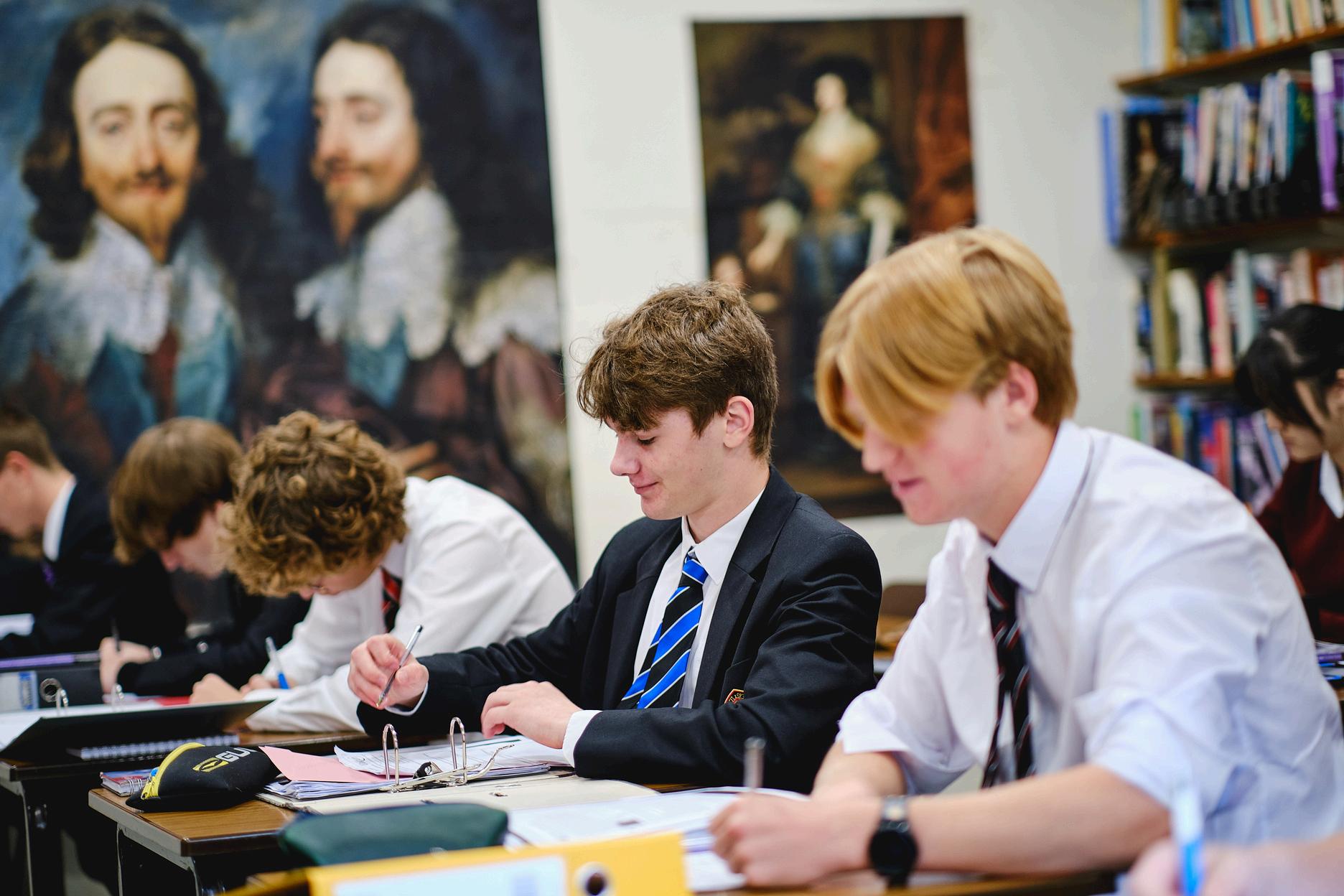
The History IGCSE provides a strong grounding in modern political, social and economic history It also raises important issues relating to constitutional law, civil rights and the right of protest in modern societies It therefore provides a strong grounding for advanced study, not only in History but also in Economics and Politics. In addition, pupils will have the opportunity to visit Berlin, Krakow and Auschwitz on a five-day tour in the early spring (a trip which has now run for over ten years)
In Latin GCSE we continue our studies of the language and, for the first time, engage with real Latin composed by some of the finest authors in the world
Form 4 sees the completion of the GCSE language requirements; by the end of Form 4, pupils have studied the key grammar and all of the defined vocabulary needed for the language paper, and we can practice and hone those skills Towards the end of Form 4, pupils will start their reading of a prose set text This takes in a short section from a famous author such as the historian Tacitus Form 5 is spent honing language skills, completing the prose text, and reading a short allocation of Virgil’s Aeneid (about Aeneas, who flees the burning Troy destroyed by the Greeks).
Latin's logical structure and its influence on English enables pupils to deepen their analytical skills and their vocabulary; engaging with the set texts enables them to extend analytical skills and develop flexibility of thought and cultural knowledge, breadth and sensitivity.
The exam consists of three separate written papers; there is no coursework, oral or listening exam These three papers are: language (passages for translation and comprehension); prose literature (questions on the prepared set text); verse literature (questions on the prepared set text).
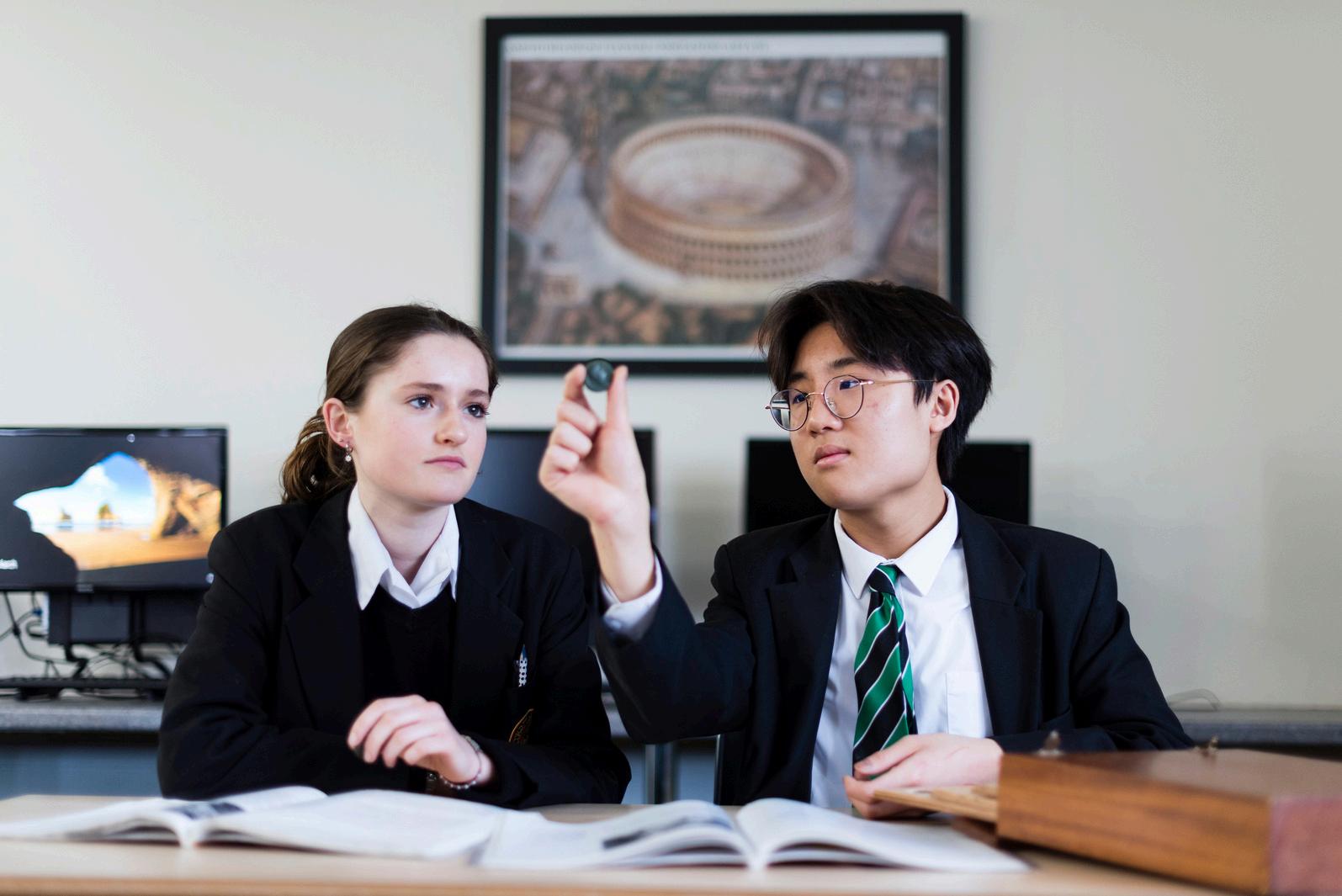
If you enjoy listening to or playing music, this course could be for you! Whatever your musical background, GCSE music will nurture your enthusiasm for and understanding of music
Understanding music encourages you to explore and engage creatively with a wide range of music and musical contexts. As well as the detailed study of two very contrasting pieces, you will develop a wider knowledge and understanding within four areas of study: Popular music (including rock, pop, musical theatre, film and computer gaming music) from 1950 to the present, traditional/folk music from around the world, and the Western classical tradition from 1650 to the present day. You will be examined on Queen's Bohemian Rhapsody and Beethoven's Symphony No. 1. You will develop your aural perception skills, as well as your ability to describe the music you hear using appropriate musical language Pupils are assessed with one listening exam (40%) at end the end of Form 5
Composing is an area that will be new to many but isn’t anything to worry about! A lot of time will be spent in Form 4 developing composition skills and there is plenty of time to experiment and work on exercises in different styles This will be the preparation for writing two assessed compositions (a minimum of 3 minutes’ music), one of which responds to a brief set by the exam board, and one of which offers pupils a free choice. These are completed in Form 5 for assessment as coursework (30%)
Performing is the area in which pupils can use their experience of practical music-making; there is no set standard so this is accessible to all levels of performers - no need to play an instrument, singing can be very successful. All pupils are assessed on one solo piece and one performed with another musician (e g an accompanied solo, or a duet) These performances are recorded by your classroom teacher and you will have the opportunity to re-record as necessary to capture you at your very best Pupils will work with their instrumental/vocal teacher through the course to prepare a minimum of 4 minutes of suitable pieces for assessment (30%) during the second year of the course
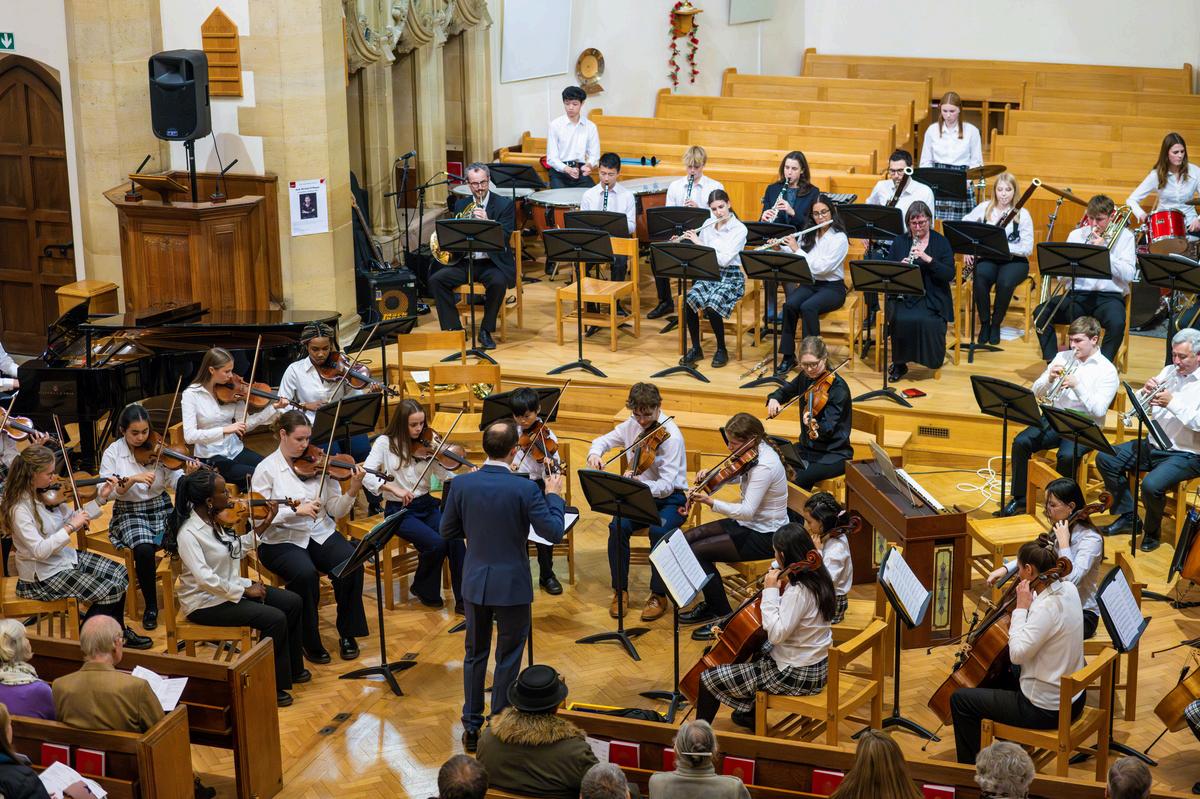
Pupils follow a course that has both examined aspects (60%) and non-examined aspects (40%).
Physical factors affecting performance (30%). 1 hour paper of 60 marks. Anatomy and physiology, and physical training
Socio-cultural issues and sports psychology (30%). 1 hour paper of 60 marks. Socio-cultural influences, sports psychology, and health, fitness and wellbeing
These papers consist of a mixture of objective response questions, multiple-choice questions, short answers and extended response items.
Written coursework (10%) 14 hours of controlled conditions, out of 20 marks
The coursework requires pupils to demonstrate their ability to analyse and evaluate their own or a peer ' s performance in a given practical activity This includes a needs analysis of the sport, highlighting the strengths and weaknesses of the performer, and then the creation of an action plan addressing the performer’s priority weakness
Practical performance in three sports (30%). Each sport is out of 20 marks
The 30% is equally weighted between the three sports (10% each). Of these three sports at least one must be an individual sport, and one must be a team sport They must also all be performed and assessed in a competitive environment
Both of the non-examined elements are internally marked and externally moderated
Pupils should have a broad interest in sport and physical activity, be motivated to examine the science behind performance and participation in sport and physical activity, or both. Although no minimum grade requirement, there is a strong crossover with Biology at GCSE, and the course is predominantly theoretical, so pupils should be aware of this
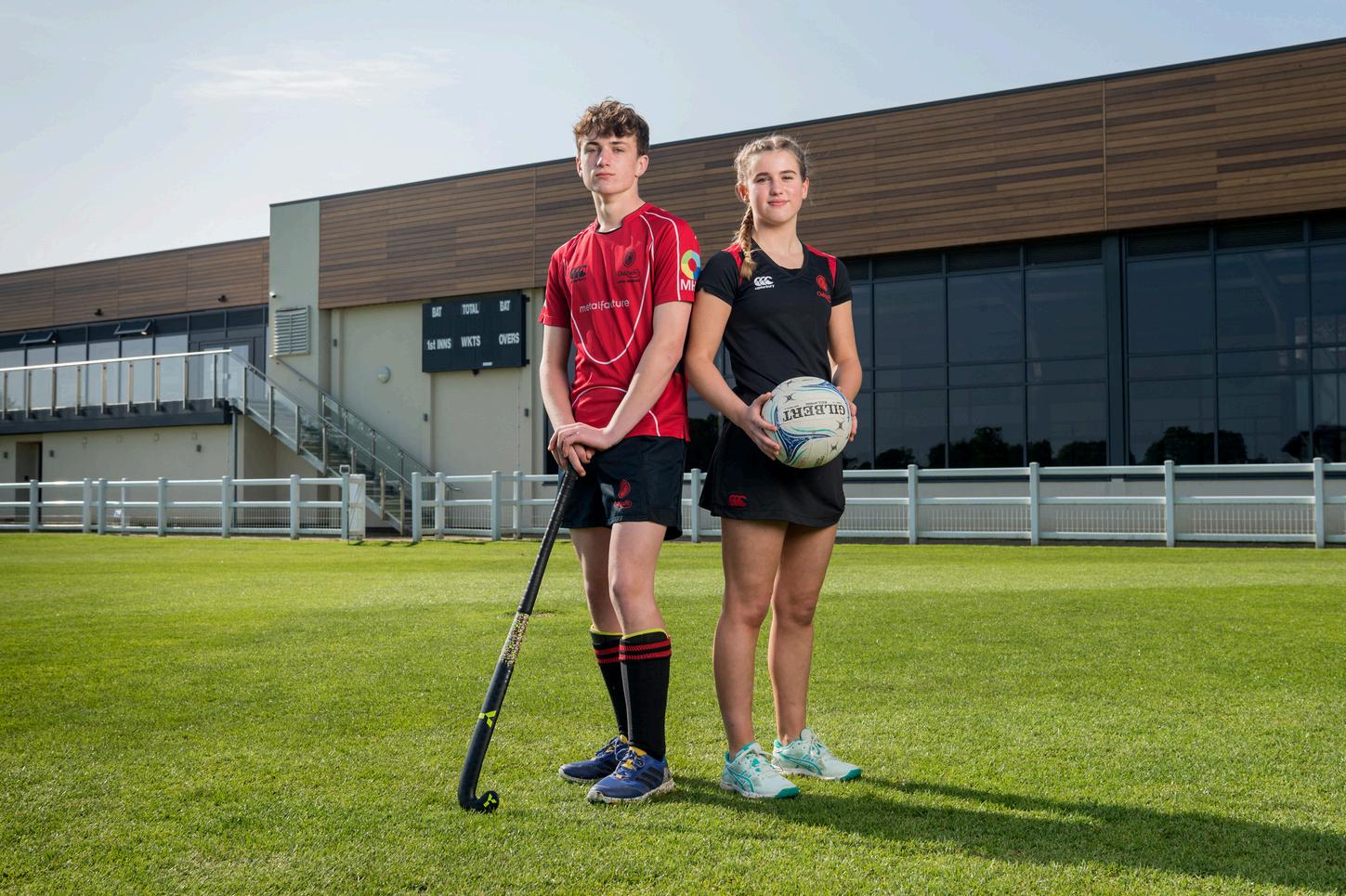
CAMBRIDGE NATIONAL LEVEL 2 EXPLORE & CHOOSE
Pupils follow a course that has both examined aspects (40%) and non-examined aspects (60%)
Reducing the risk of sports injuries and dealing with common medical conditions (40%) 1 hour 15-minute paper of 70 marks It covers five topics:
Different factors which influence the risk and severity of injury
Warm-up and cool-down routines
Different types and causes of sports injuries
Reducing risk, treatment, and rehabilitation of sports injuries and medical conditions
Causes, symptoms, and treatment of medical conditions
This paper consists of a mixture of objective response questions, multiple-choice questions, short answers and extended response items
NON-EXAMINED COMPONENTS
Two coursework units (60%) The coursework components consist of one mandatory unit (Applying the principles of training: fitness and how it affects skill performance) and one further optional unit. These units are set by OCR on an annual basis and one resubmission is allowed following their initial submission (if required).
There is no assessment in a pupil’s practical performance of sport(s)
Pupils should have a broad interest in sport and physical activity, be motivated to examine the science behind performance and participation in sport and physical activity The course is based on theoretical concepts and d
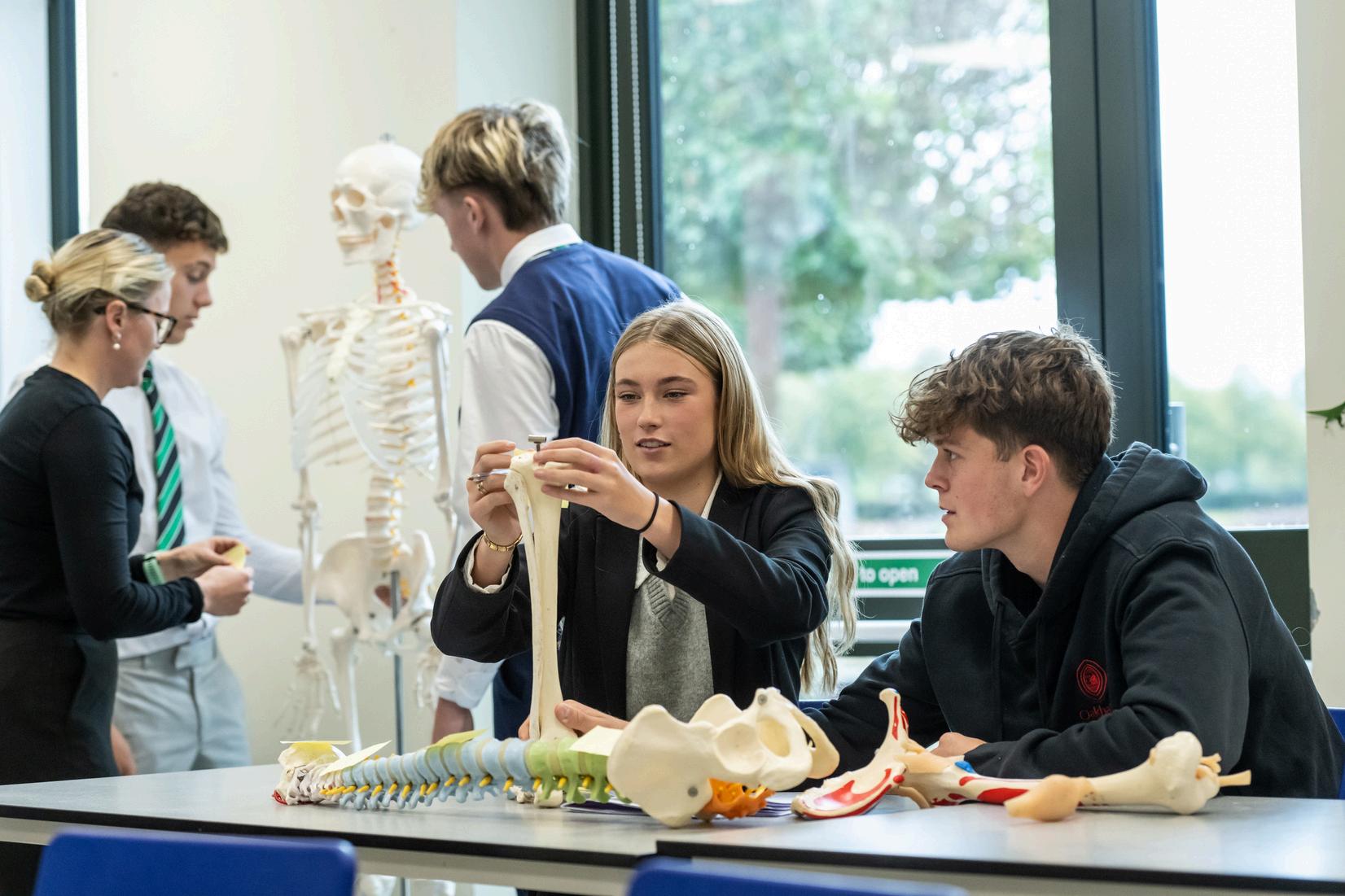
Religion and Philosophy is an opportunity to explore the fundamental questions of human existence through contrasting religious and philosophical perspectives. In a globalised world, it is increasingly important to understand and reflect on the different moral and theological positions held by those with strong religious beliefs and those with none To do so, it is necessary to subject both our own beliefs and those of others to critical scrutiny – not with the aim of agreeing with the latter, but of understanding the basis for them
The course is split into two equal parts: Philosophy of Religion and Ethics and Religious Beliefs and Practices; both parts are assessed by examination alone – there is no coursework Philosophy of Religion and Ethics explores questions such as ‘What is God?’ ‘Why does God allow suffering?’ ‘What is the soul?’ ‘Do I have a duty to help the poor?’ ‘What is the relation between science and religion?’’ ‘Should capital punishment be reintroduced?’ ‘Is religion sexist?’ ‘Is forgiveness a moral duty?’ ‘What is a human being?’ and ‘Should euthanasia be legalised?’ We aim to discuss these questions from personal, philosophical and religious perspectives
Religious Beliefs and Practices provides an opportunity to examine Buddhism and Christianity in depth and to explore their similarities and differences. Buddhism is a fascinating Eastern religion which has no deity and followers are encouraged to forgo material pleasures for greater spiritual gain Whilst Christianity is the largest religion in the West, it is much more complex and challenging than many people realise and thus, is perfect for advanced study at GCSE.
